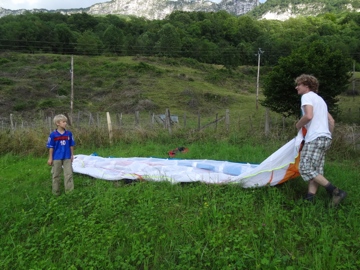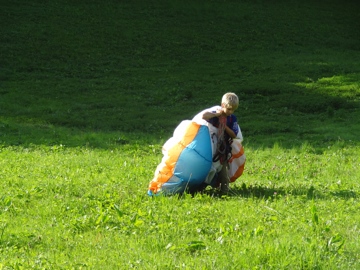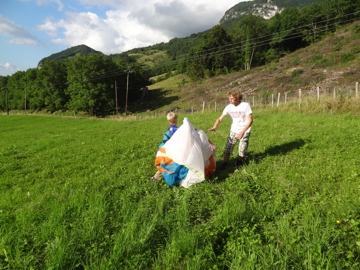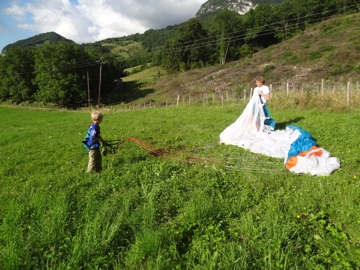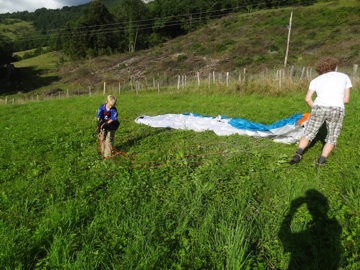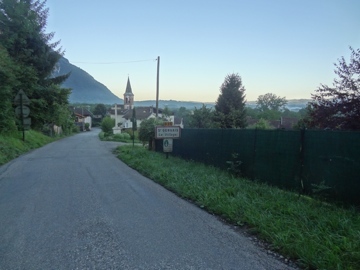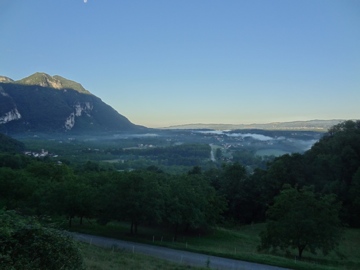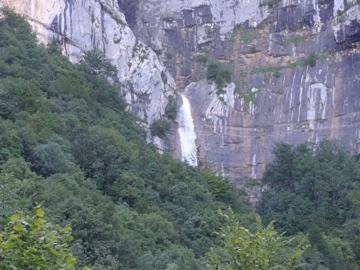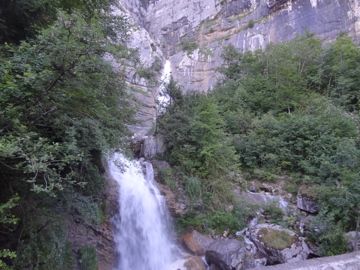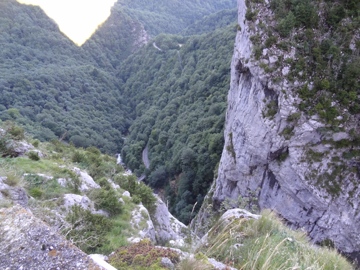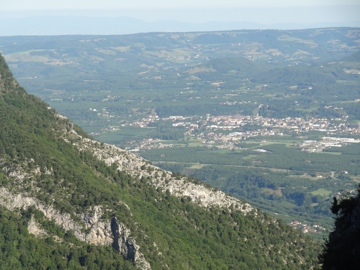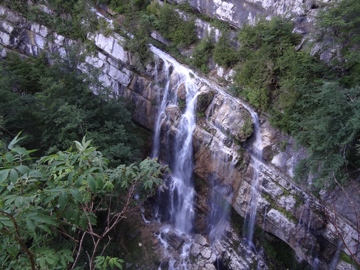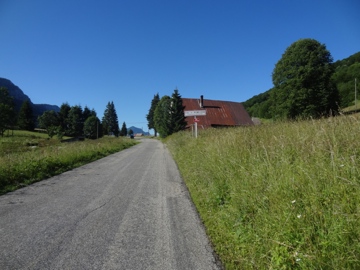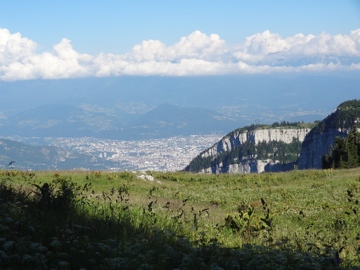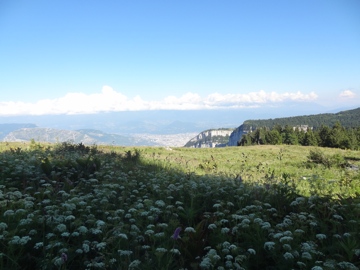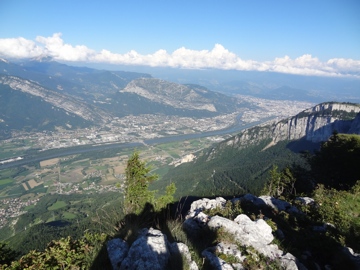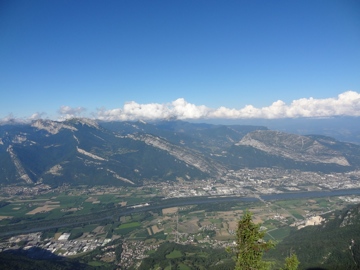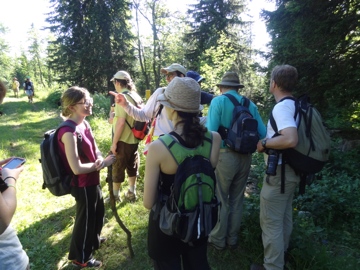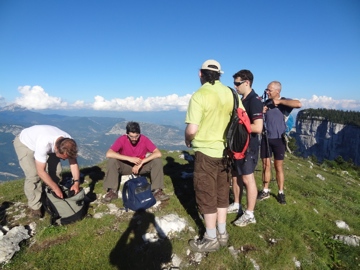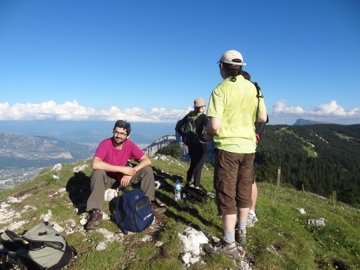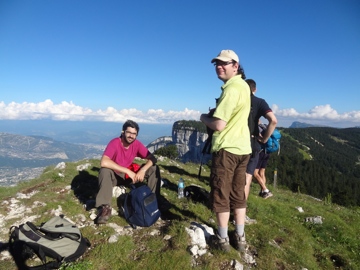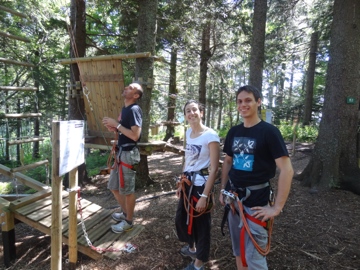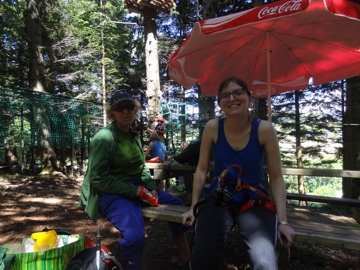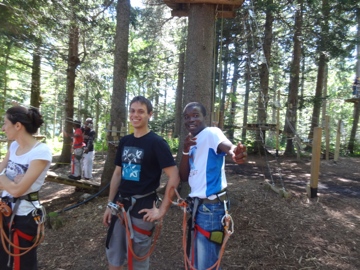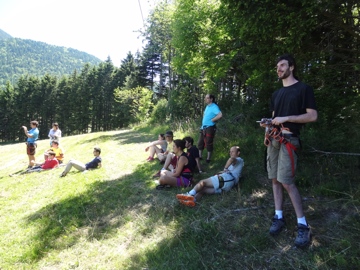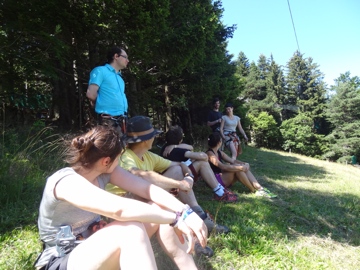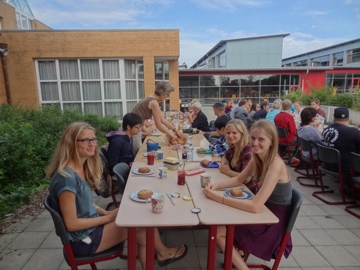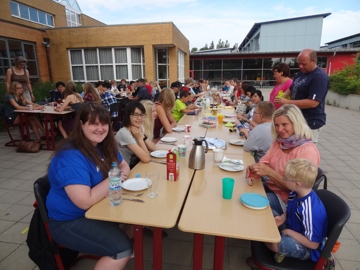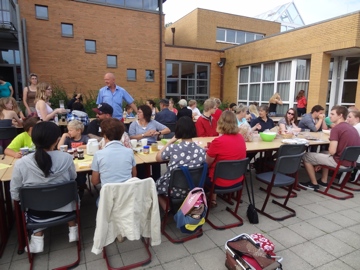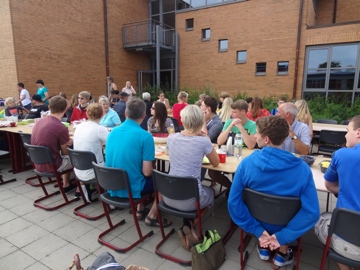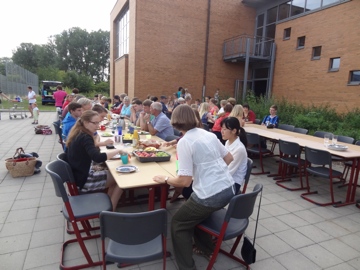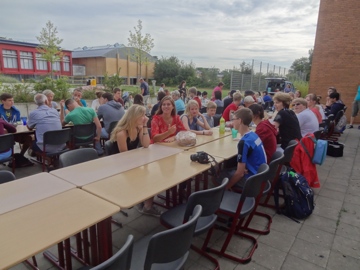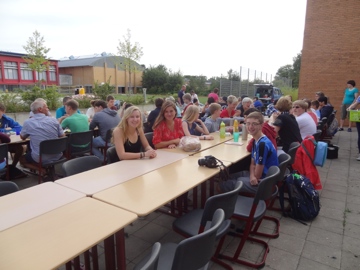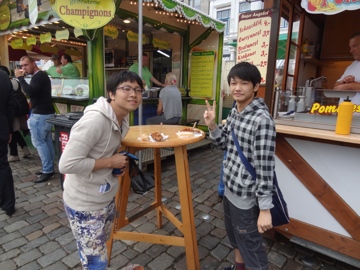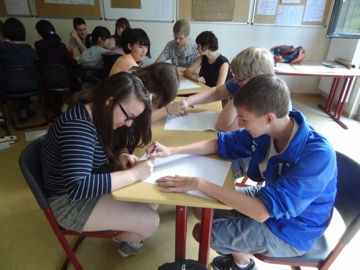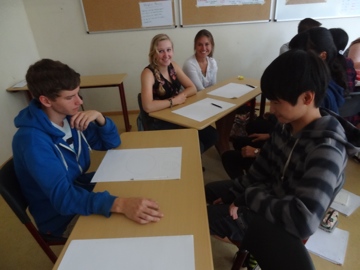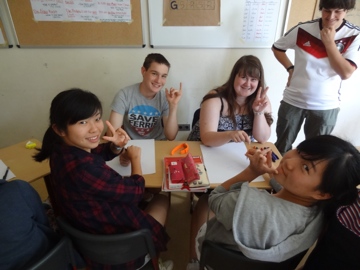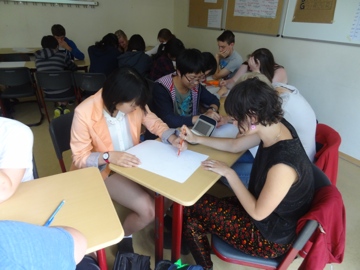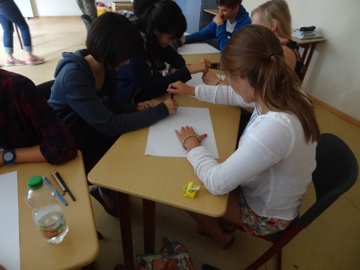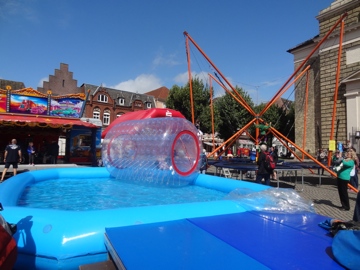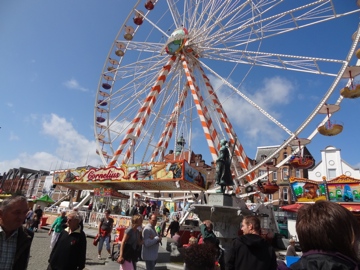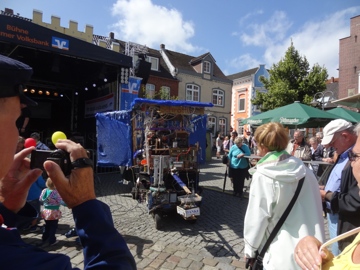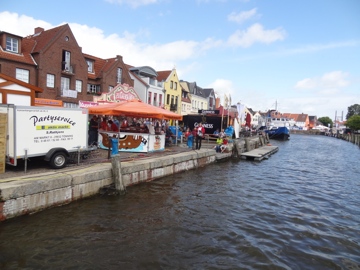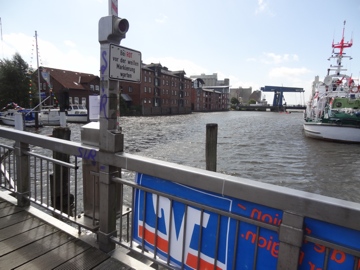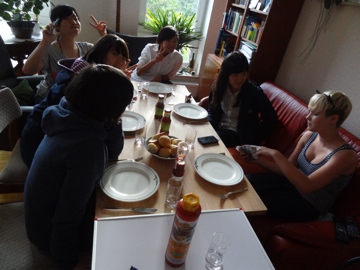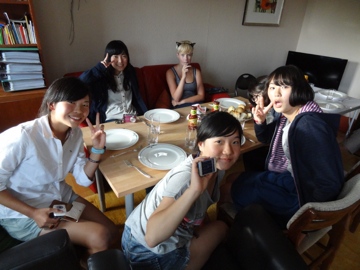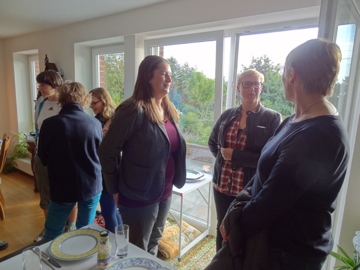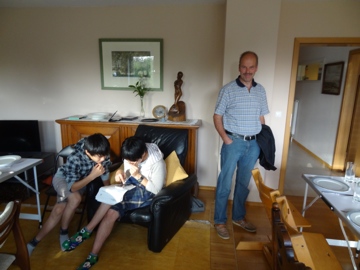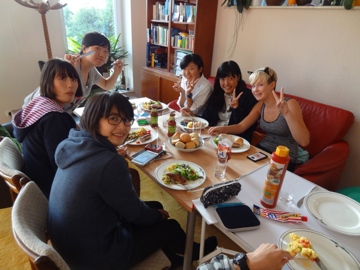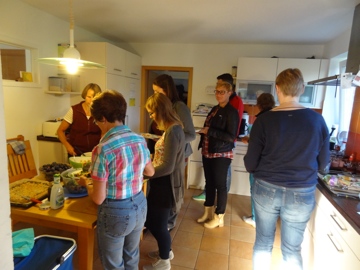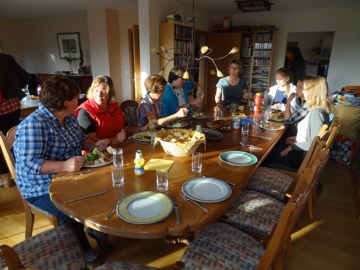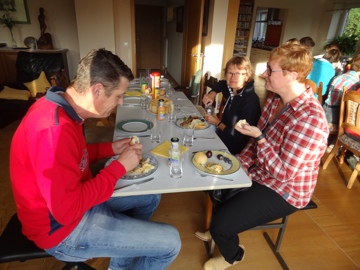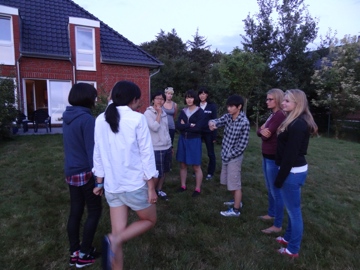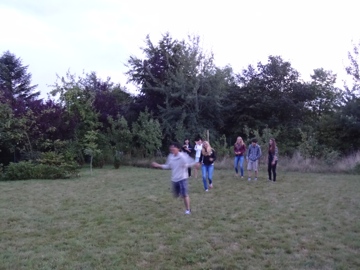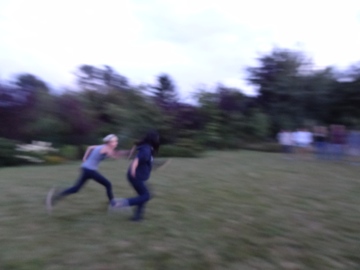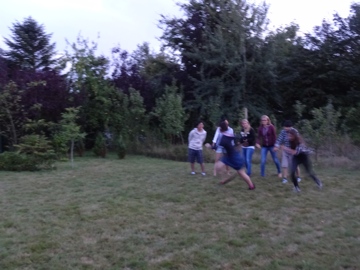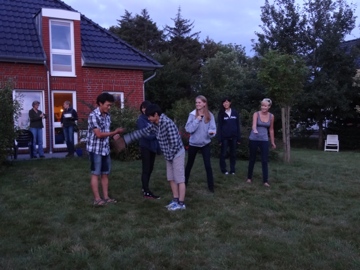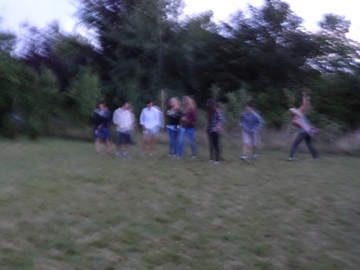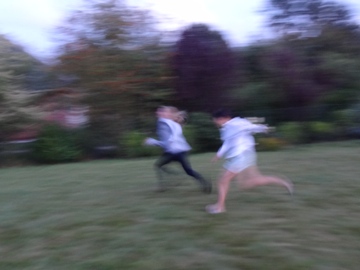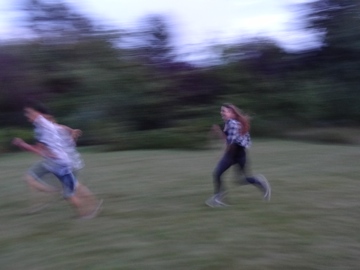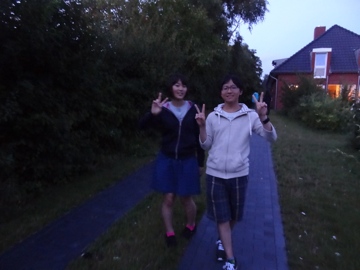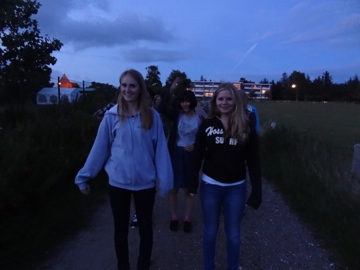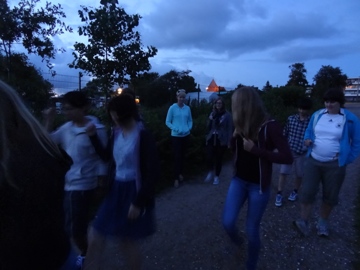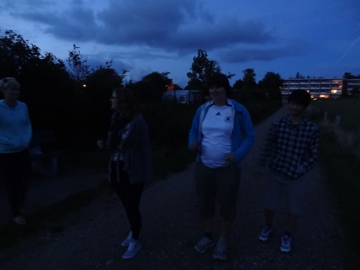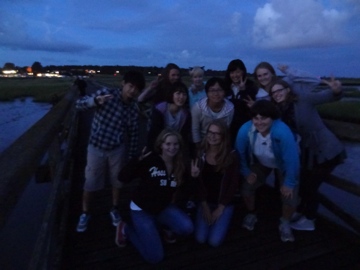Summer vacation 2014!
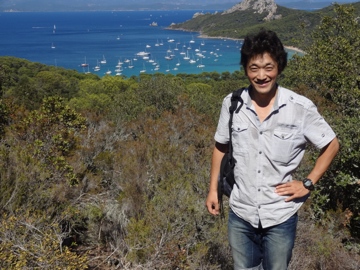 My trip from Lyon to Tokyo in 2012 and 2013 was simply brilliant, even though in the end I had had enough of cycling. However, after a year of silence in Lyon, I came up with a whole range of brilliant ideas, involving cycling, teaching German, holding a presentation and a heavenly beach on an island of southern France. Here's what it looked like:
My trip from Lyon to Tokyo in 2012 and 2013 was simply brilliant, even though in the end I had had enough of cycling. However, after a year of silence in Lyon, I came up with a whole range of brilliant ideas, involving cycling, teaching German, holding a presentation and a heavenly beach on an island of southern France. Here's what it looked like:
7/12-7/14: Cycling in the Alps
7/15-7/16: lab trip near Grenoble
7/16-8/3: Cycling through Germany
8/4-8/22: German course for Japanese pupils in Husum/Germany
8/23: to Paris
8/24-8/29: conference in Paris
8/30-8/31: to the Mediterranean sea
9/1-9/5: summer school on the Porquerolles island
9/6-9/9: back to Lyon
Lab trip
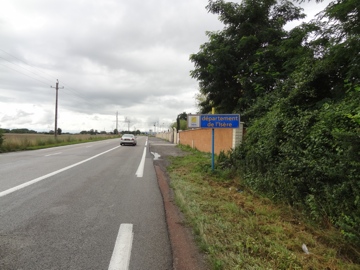 I really really wanted to start my trip on the 12th, but in the end it was simply raining all the time... At least it stopped two days later, just a day before the lab trip. Well, I could not see the Alps in the end but I could go to Vercors by bicycle.
I really really wanted to start my trip on the 12th, but in the end it was simply raining all the time... At least it stopped two days later, just a day before the lab trip. Well, I could not see the Alps in the end but I could go to Vercors by bicycle.
As you can see on the photo the weather was still not quite satisfying. Well, maybe I should think that it was nice that it was not too hot to cycle...
July 14. is probably the most important day for France, which of course is a holiday. And since it happened to be a Monday, people probably had already gone somewhere by car. Anyway, I could see scarcely a car the entire day.
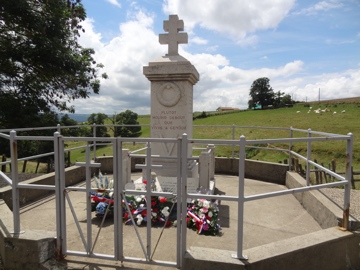 If you see something like this on at a very normal street in France, for sure it is something about 14-18 or 39-45. It's also clear but this difference made the mentalities of Germany and France completely different, i.e. quite a lot of clichés about "French" and "German" can go back to this fact.
If you see something like this on at a very normal street in France, for sure it is something about 14-18 or 39-45. It's also clear but this difference made the mentalities of Germany and France completely different, i.e. quite a lot of clichés about "French" and "German" can go back to this fact.
The distance between Lyon and Vercors is around 150km. I didn't want to arrive too early there, since we, the first year Ph.D's were supposed to do presentations in the morning of arrival. On the other hand I arrived at the mountain too early (Vercors is essentially a mountain, which contains a very nicely shaped valley inside. Look it up on google maps). Since I didin't have anything to do, I just started eating somewhere in the field.
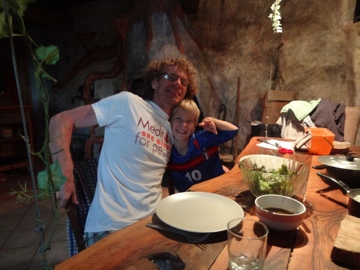 After the "dinner", I simply started talking to people, especially to know what the road in front of me looks like and whether there's a place to put my tent. As in many countries, the people in villages in France are quite different than those who live in big cities, Lyon for example. I once met an old woman who had never seen an Asian in life (and her first was even a Japanese!)
After the "dinner", I simply started talking to people, especially to know what the road in front of me looks like and whether there's a place to put my tent. As in many countries, the people in villages in France are quite different than those who live in big cities, Lyon for example. I once met an old woman who had never seen an Asian in life (and her first was even a Japanese!)
I was in a very small village called St. Gervais, with around 400 inhabitants. There was one villager, Olivier, who was about to go to his farm. We got into a conversation. Actually he was interested in Japan and travelling. Aha. After talking around 20 minutes, he invited me to his place. Too nice!!
This kind of contact has so far happened fairly often, but this was the very first time in France. Well, Olivier was also the one who did not like this kind of problem in France.
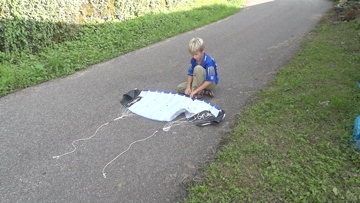 ... and there was this small boy of 9 years, Néotis, who reminds me of a mixture of the kids of my boss and Till Magnus (of 10 years ago... btw. Till Magnus will certainly appear below). If you click on the video, you can see Néotis explaining me how to use a paraglider (? I don't know what it's exactly called in English. In French it's Parapente. Watch the video for more explanation :) This one is normally allowed from the age of 12, but since Olivier is professional (?) Néotis could learn it from him. Apparently you can fly as long as you want, if there's a thermal bath which creates a upward stream, like asphalted streets for example.
... and there was this small boy of 9 years, Néotis, who reminds me of a mixture of the kids of my boss and Till Magnus (of 10 years ago... btw. Till Magnus will certainly appear below). If you click on the video, you can see Néotis explaining me how to use a paraglider (? I don't know what it's exactly called in English. In French it's Parapente. Watch the video for more explanation :) This one is normally allowed from the age of 12, but since Olivier is professional (?) Néotis could learn it from him. Apparently you can fly as long as you want, if there's a thermal bath which creates a upward stream, like asphalted streets for example.
As soon as Olivier finished his work in the farm, we went higher in the mountain to have a nice slope for the practice of Néotis.
The dream of Olivier was to travel around the world by paraglider. I just wonder why there hasn't been anyone who already did it. Or has there been anyone? I just think like it would be so good if I could combine the paraglider and the bicycle, since the paraglider works when you have a head wind, contrarily to the bicycle.
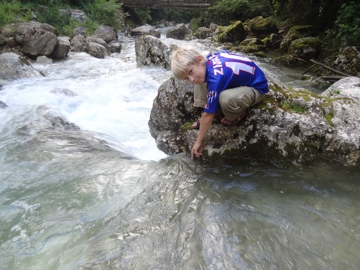 Olivier and Néotis took me then to the place which only locals know about. We went through streets that were even not streets, getting into the core of the forest. Actually there was a cascade behind this picture so try to find it yourself (by going there).
Olivier and Néotis took me then to the place which only locals know about. We went through streets that were even not streets, getting into the core of the forest. Actually there was a cascade behind this picture so try to find it yourself (by going there).
Couch surfing on the fly... I didn't take so many pictures inside the house but it's the best part of cycling trips. And I simply didn't think this would ever happen in France.
I could fully sleep in the bed and following day, I had to climb up to 1000m twice. Once from 200m and once from 400m. Whether it was hard or not (which it wasn't), the landscape was fabulous. Every now and then I just wonder if ever it is possible to take a picture which contains the dynamics of what you see. And here, I'm sorry that you can scarcely see how impressive the view from high above the sky was. Again, go there yourself and see what I mean with that. This one can be seen just after a tunnel of 500m, which has no light inside (so if you go there on foot, be sure that you have a good light.)
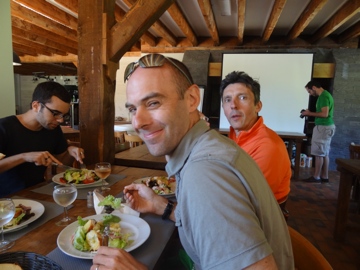 I was planning to arrive in Autrans at noon, where there was this lab trip I longed for such a long time for, for which there was a serie of presentations planned for Ph.D in the first year in the morning. I could precisely arrive between this and the lunch. Too cool! but my presentation was pushed behind to tomorrow. hmm... Anyway, not only this la trip one destroyed my Moscow plan, but also I eventually would not be able to go to Italy. Well, so much for the complaints. At least this guy, Damien, seemed to be happy to be on a trip.
I was planning to arrive in Autrans at noon, where there was this lab trip I longed for such a long time for, for which there was a serie of presentations planned for Ph.D in the first year in the morning. I could precisely arrive between this and the lunch. Too cool! but my presentation was pushed behind to tomorrow. hmm... Anyway, not only this la trip one destroyed my Moscow plan, but also I eventually would not be able to go to Italy. Well, so much for the complaints. At least this guy, Damien, seemed to be happy to be on a trip.
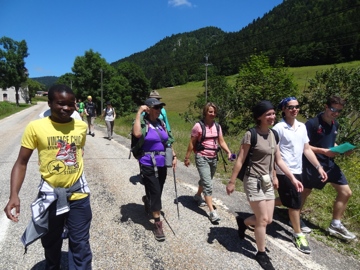 The fun part of the stuff started in the after noon. Hiking in the forest. Actually there were treasures hidden in the forest and apparently this was the main purpose but I eventually never understood why we were looking at the map of the forest etc... It's so nice to do a physical activity with the members of the lab, which pretty much never occurs if you stay at work. And there are at least three persons who dropped out before reaching the goal in this photo. Try to guess who :)
The fun part of the stuff started in the after noon. Hiking in the forest. Actually there were treasures hidden in the forest and apparently this was the main purpose but I eventually never understood why we were looking at the map of the forest etc... It's so nice to do a physical activity with the members of the lab, which pretty much never occurs if you stay at work. And there are at least three persons who dropped out before reaching the goal in this photo. Try to guess who :)
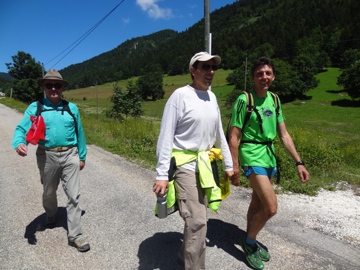 And here appears finally my boss, Michel, who came to Autrans by bicycle as well (NICE!! even if it was just from Grenoble). Along with my boss of two years ago, Patrice, he is one of the most physically active members of the lab, especially in hiking and cycling (and to be more precise, Patrice and Michel met each other while hiking...). France is a very strange country concerning sciences (which will be certainly the topic of an article I will write in the future), and I find it usually very unconfortable to attend to any kind of official session, but I'm so happy that I could have these frank guys as bosses that I can share interests a lot with. :)
And here appears finally my boss, Michel, who came to Autrans by bicycle as well (NICE!! even if it was just from Grenoble). Along with my boss of two years ago, Patrice, he is one of the most physically active members of the lab, especially in hiking and cycling (and to be more precise, Patrice and Michel met each other while hiking...). France is a very strange country concerning sciences (which will be certainly the topic of an article I will write in the future), and I find it usually very unconfortable to attend to any kind of official session, but I'm so happy that I could have these frank guys as bosses that I can share interests a lot with. :)
After the "treasure hunting" most of the members went back tothe lodge. Those who didn't want to, continued, until we found out we were lost.
The nature of Autrans is splendid. It is actually enclosed by a range of mountains, which create a sort of basin. Hence inside Autrans there's pretty much no wind and on the top of the mountain you can see farm land and a modern city, e.g. Grenoble (cf. photo), at the same time. Bravo the two nerdiest nerds of the lab who made it up here!!
Back in the lodge, the others had already started their apero (appetizer, which takes sometimes even several hours in France). And karaoke in the evening. Europeans are not used to sing in public and French apparently sing only in French, which has a sort of chanson-latino mixture. I don't know what they thought of the way of singing of a person at the end of the evening who came from the country of karaoke.
I could not sleep well in the lodge. I think it's because of the bed there. Actually, it doesn't matter wherever I am, I cannot sleep in a hotel, whereas I find it comfortable to sleep in my tent. Maybe I should have installed a tent inside the lodge.
Following day, after my misplaced presentation and all the other stuff, we again went to the mountain for tree climbing. Of course it was more important for me to go there by bicycle and I just slept there on the spot. In total, I don't know exactly whether I did any contribution to the lab trip in total but anyway I enjoyed it in my way :)
Hm yes, even though I did not like the idea to go there at first, it turned out that I enjoyed it a lot. I'm looking forward to that of the next year :)
Cycling trip to Husum
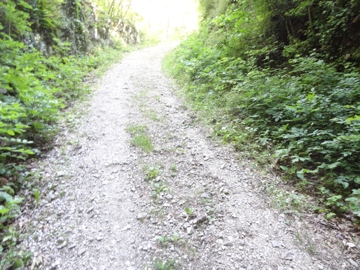 Back to the civilization, what a horrible thing. Autrans is located at 1000m above sea level and I could feel the temperature of the world below.
Back to the civilization, what a horrible thing. Autrans is located at 1000m above sea level and I could feel the temperature of the world below.
My boss, Michel, once again, wanted to take a road, that was not even a road, which looked like on the photo. He likes adventures, as I do, though I'm not sure if I can continue my passion as long as he did in his life :)
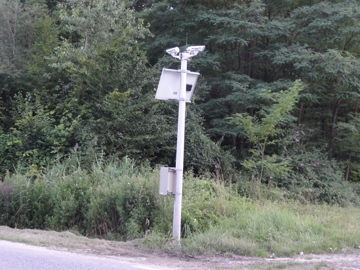 Until the last time (like a day before), I always wrote down the streets to take, but now, not being able to find out which way would lead to Husum most efficiently, I simply wrote down simply the names of the cities and I decided to follow the signs, which turned out to be a very nice strategy.
Until the last time (like a day before), I always wrote down the streets to take, but now, not being able to find out which way would lead to Husum most efficiently, I simply wrote down simply the names of the cities and I decided to follow the signs, which turned out to be a very nice strategy.
In the middle of nowhere in the forest near Grenoble, I noticed that there are a lot of surveillance cameras... why??
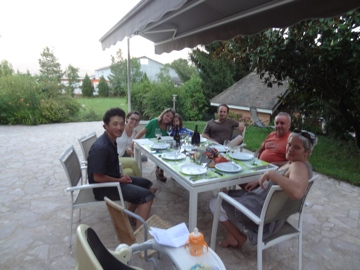 From Grenoble to Chambéry, Annecy, Geneva, it is not complicated to find the right routes, but there are just not so many cities. It was even very hard to find a place to buy small stuff for the evening.
From Grenoble to Chambéry, Annecy, Geneva, it is not complicated to find the right routes, but there are just not so many cities. It was even very hard to find a place to buy small stuff for the evening.
If you go to France, everyone will probably tell you that French are not hospitable. Let alone asking them for a place to sleep... Fortunately there was plenty of space to camp so I just stopped at a small river, where I noticed that there was an entrance, open.
I did not want to come up with bad surprise to the inhabitants. So I got inside to tell them that I was about to put my tent next to the river, which ended up giving me a nice occasion to have a French dinner with locals. Aha? Such a thing happens in France?
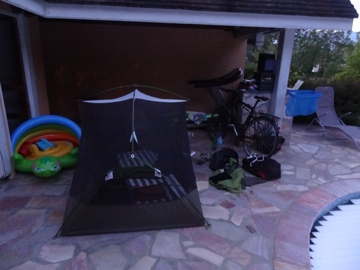 The traditional French dinner is very special. You start with an appetizer, then to the main menu and you eat cheese (whatever the reason is) and you finish with desert, red wine in company. I once cut a camembert in slice when I arrived in France (which a friend of mine from Germany also did later on), and the messieurs next to my table gave me a derisive coup d'œil. On the other hand, if you can do it correctly, you are French, which may or may not be a compliment (mostly depending on your personality)
The traditional French dinner is very special. You start with an appetizer, then to the main menu and you eat cheese (whatever the reason is) and you finish with desert, red wine in company. I once cut a camembert in slice when I arrived in France (which a friend of mine from Germany also did later on), and the messieurs next to my table gave me a derisive coup d'œil. On the other hand, if you can do it correctly, you are French, which may or may not be a compliment (mostly depending on your personality)
Ah my dear tent. I could sleep so well.
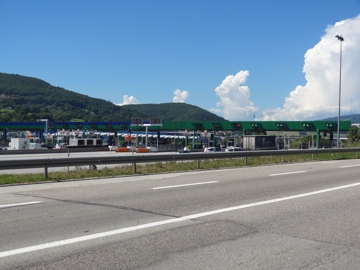 France is still one of the most stupid countries which haven't abolished the toll gates. And probably that's also the reason why there are so many cars on the country side. With Europe heading for an ecological society I hope there'll be one day that France notices how useless this stuff actually is.
France is still one of the most stupid countries which haven't abolished the toll gates. And probably that's also the reason why there are so many cars on the country side. With Europe heading for an ecological society I hope there'll be one day that France notices how useless this stuff actually is.
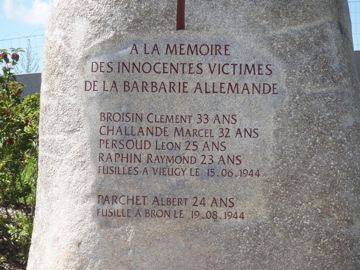 It was a very hot day and I was cycling just before Geneva. Pretty much no bicycle on the way. Only plenty of cars. I may have written it somewhere but France, in contrast to Germany, has a lot of fields, especially in the Alps, just as you can think of Heidi. So on the top of a mountain you can see pretty much everywhere. And from everywhere, you can see the top of the mountain. And since everyone can see the top of the mountain, it is clever to build a monument, to mourn for those who died during the war for example. Here on the photo it's written: "For the remembrance of the innocent victimes of the German barbarism". Hmm... It blows away my Heidi...
It was a very hot day and I was cycling just before Geneva. Pretty much no bicycle on the way. Only plenty of cars. I may have written it somewhere but France, in contrast to Germany, has a lot of fields, especially in the Alps, just as you can think of Heidi. So on the top of a mountain you can see pretty much everywhere. And from everywhere, you can see the top of the mountain. And since everyone can see the top of the mountain, it is clever to build a monument, to mourn for those who died during the war for example. Here on the photo it's written: "For the remembrance of the innocent victimes of the German barbarism". Hmm... It blows away my Heidi...
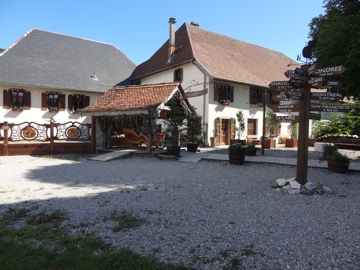 If you happen to go to Geneva from Annecy, be careful at around 20km to Geneva. There's a village of Santa Claus. Obviously there was no one working in this season but there was a sleigh and a reindeer waiting for the next season (can you see the beast on the photo?).
If you happen to go to Geneva from Annecy, be careful at around 20km to Geneva. There's a village of Santa Claus. Obviously there was no one working in this season but there was a sleigh and a reindeer waiting for the next season (can you see the beast on the photo?).
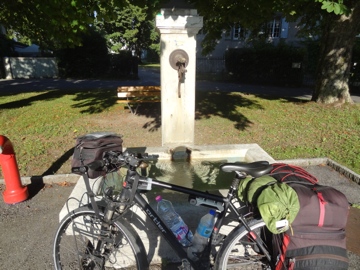 Geneva, one of the most expensive cities in the world, if not the most. I still remember my first visit to this city of mid-2012, where I bought a Mc menu for 12 euros. Still I was probably lucky because there was nothing less expensive than that one.
Geneva, one of the most expensive cities in the world, if not the most. I still remember my first visit to this city of mid-2012, where I bought a Mc menu for 12 euros. Still I was probably lucky because there was nothing less expensive than that one.
Actually I really really didn't like the idea of cycling though Switzerland, because this is simply the country of security and anti immigration (though I cannot say a word being Japanese...) And I don't like the Franc. This is the currency that makes you feel you are poor.
Well even if everything is very expensive in Switzerland, I discovered a very positive side as well: public fountains. Actually everywhere in Switzerland you can find a fountain of potable water. So essentially if you are on the way on your bicycle, you don't need to care about it. Just go to one of the smallest villages nearby and get water. That's all :)
If you are in Geneva, or at the lake Léman, you will see how rich the people are. I didn't even expect them to be hospitable, so I simply cycled through until I found a camping place.
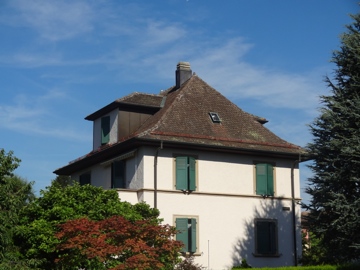 The fact that I'm not in France anymore can be seen also from the structure of houses. I'm still in the French part of Switzerland, but the roof has become significantly pointed.
The fact that I'm not in France anymore can be seen also from the structure of houses. I'm still in the French part of Switzerland, but the roof has become significantly pointed.
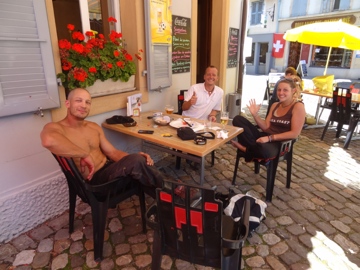 Maybe it's simply due to the politics of immigration of France (and the descendants of those who immigrated to France), that the personalities of French vary really a lot. If I'm lost in France and I ask someone for the way, I may end up being treated like a fool or holding a very long conversation and being invited for dinner. Maybe this comes from the Latino mentality that I haven't really figured out how it works. Anyway there are a lot of people who talk to me, like the guys on the photo. :)
Maybe it's simply due to the politics of immigration of France (and the descendants of those who immigrated to France), that the personalities of French vary really a lot. If I'm lost in France and I ask someone for the way, I may end up being treated like a fool or holding a very long conversation and being invited for dinner. Maybe this comes from the Latino mentality that I haven't really figured out how it works. Anyway there are a lot of people who talk to me, like the guys on the photo. :)
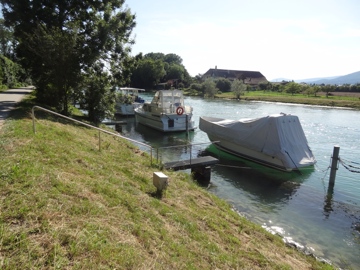 You certainly know that there are three or four official languages in Switzerland. The region I visited was French at first and before I enter Germany I should be in a German speaking region. Where is the border?
You certainly know that there are three or four official languages in Switzerland. The region I visited was French at first and before I enter Germany I should be in a German speaking region. Where is the border?
The answer is not quite obvious, but in my case, it was when I crossed the Zihl channel, which is called Thielle channel in French. Suddenly all the signs were written in German and people started to speak German. Actually this channel connects two lakes and the north-western side of the channel/lakes is the French speaking region and the other side was German. So the interesting thing is that I was that I crossed the channel and the people started to speak German, but at the tip of the lake (the other side of the channel) there is a bilingual city called Biel/Bienne. What may be more interesting is that, although I speak German much better, I didn't understand a word when I arrived in the first city in the German speaking part. This is generally the case in this region, like in Strasbourg for example.
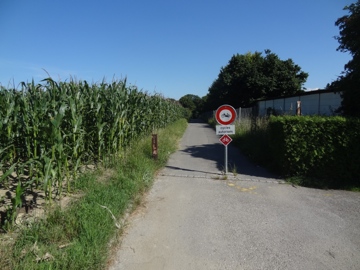 Have you ever tried to cycle in France? I have done it several times and every time, I can see some signs for cyclists. And I have tried to follow them several times, in vain. The problem is simply, there are too many signs missing. And if there is just ONE sign missing, you cannot find the way anymore, since the cycling roads are usually very narrow streets that no one really knows (and therefore no one can help you...)
Have you ever tried to cycle in France? I have done it several times and every time, I can see some signs for cyclists. And I have tried to follow them several times, in vain. The problem is simply, there are too many signs missing. And if there is just ONE sign missing, you cannot find the way anymore, since the cycling roads are usually very narrow streets that no one really knows (and therefore no one can help you...)
When I arrived in Switzerland first, I didn't pay attention to the signs at first. But since I could see them so often, I just thought I should maybe give it a try, which in the end turned out to be a very good decision. You can go even pretty much everywhere with these signs, not only to big cities. Too nice!
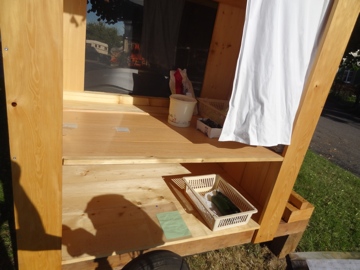 I come from Tokyo, probably one of the safest cities in the world. The potilics of security of Switzerland made it also possible to create something resembling to what used to be only in Japan in my mind: free stand. This was a good example of a stand where no one is vending anything. It's just standing there and you put money yourself if you want to buy something. I think it's not impossible to do something like this in Germany but I can easily imagine that Germans do not want to rely on anything like this....
I come from Tokyo, probably one of the safest cities in the world. The potilics of security of Switzerland made it also possible to create something resembling to what used to be only in Japan in my mind: free stand. This was a good example of a stand where no one is vending anything. It's just standing there and you put money yourself if you want to buy something. I think it's not impossible to do something like this in Germany but I can easily imagine that Germans do not want to rely on anything like this....
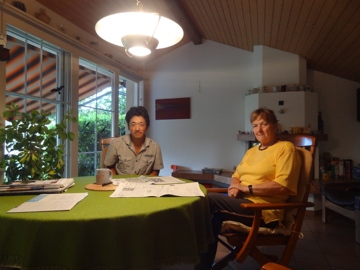 I left the French speaking part of Switzerland. Now I'm culturally in Germany... Is it possible to ask anyone to allow me to put a tent in the garden? impossible... Still I had to find a place to stay overnight so I asked the locals there. After a couple of failed tries, I spotted on an uncultivated area surrounded by houses. I just simply asked one of the neighbors if it belongs to her. Then she kindly offered her garden to me. Whaaat??
I left the French speaking part of Switzerland. Now I'm culturally in Germany... Is it possible to ask anyone to allow me to put a tent in the garden? impossible... Still I had to find a place to stay overnight so I asked the locals there. After a couple of failed tries, I spotted on an uncultivated area surrounded by houses. I just simply asked one of the neighbors if it belongs to her. Then she kindly offered her garden to me. Whaaat??
Following day, while I was preparing for departure, she came out of the house and asked me if I wanted a cup of coffee. Whaaat?? I went into the house and then she prepared a breakfast for me. WHAAAT??
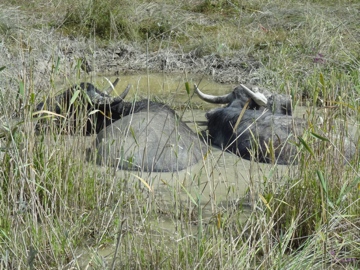 I started a very good day after that. I felt at least as fresh as these cows (?) in the water.
I started a very good day after that. I felt at least as fresh as these cows (?) in the water.
The difficulty of the German language in this part of Switzerland turned out to be more complicated than I thought. Actually we had an exchange student from Switzerland in 2006. And I remember that he could speak standard German. The reality was that not only they could not really speak standard German, but also they even could not understand MY German. I didn't even think there'd be a region like that ...
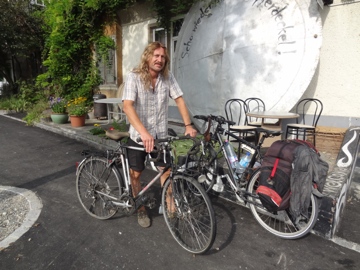 When I was near the border to Germany, I bumped into an owner of a pub, who was actually intensely looking at me. Since I was also looking for a place to rest, I stopped there. Actually this guy had been up to the Japanese sea in 1991, cycling across Russia. Aha? Was it possible at that time? Well apparently yes. He even started his journey in February of that year. Is it possible to cycle in February in Switzerland? Apparently yes.
When I was near the border to Germany, I bumped into an owner of a pub, who was actually intensely looking at me. Since I was also looking for a place to rest, I stopped there. Actually this guy had been up to the Japanese sea in 1991, cycling across Russia. Aha? Was it possible at that time? Well apparently yes. He even started his journey in February of that year. Is it possible to cycle in February in Switzerland? Apparently yes.
This was his beloved bicycle, a Dutch-Japanese bicycle. In front of my contemporary bicycle, his appeared too fragile to me but at that time it was THE best bicycle.
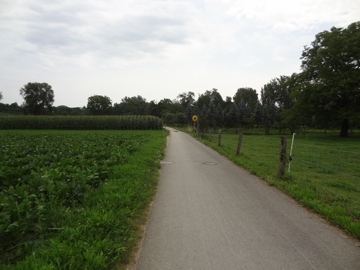 I don't know what it looked like historically, but I know that there's a gate in Geneva between Switzerland and France. What about Germany and Switzerland? It looks just as on the photo. Can you see the border? It's exactly there where there's a sign with the German Adler. Can you see it now?
I don't know what it looked like historically, but I know that there's a gate in Geneva between Switzerland and France. What about Germany and Switzerland? It looks just as on the photo. Can you see the border? It's exactly there where there's a sign with the German Adler. Can you see it now?
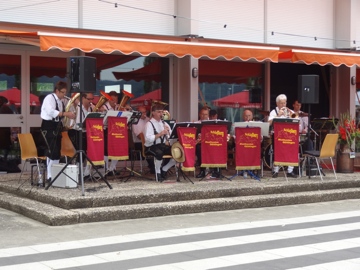 Finally Germany!!! For those reading this blog maybe it didn't appear to be a long way but it was fairly mountaneous and the heat was not negligeable, either.
Finally Germany!!! For those reading this blog maybe it didn't appear to be a long way but it was fairly mountaneous and the heat was not negligeable, either.
Just after I arrived in Germany, I could feel a huge difference between Switzerland and Germany: people speak standard German and they understand what I say... Finally, I came back to Germany...
It was a Sunday. No one works on Sunday in Germany. On a local festival, there was a music troup from Güttingen. In Switzerland by the way, there was one city called Döttingen. Do you know where I studied?
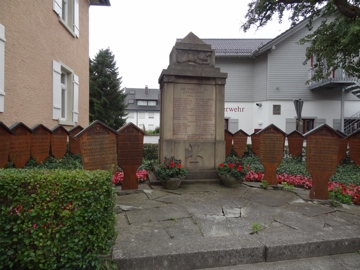 It's quite rare in Germany but there's a counterpart of the monuments of WWI and WWII also in Germany. These ones, however, are much more sombre and inconspicuous. Well, if I think of the fact that there's even pretty much no monument in Japan, maybe it's a better attitude of Germans to construct something like this. Anyway it was more important for them to build a monument in front of their Bundestag for the Jews who died during the war. For Japanese politicians, it is apparently more important to deny the Nanjing massacre and the troop 731. I'm happy that I'm in Europe...
It's quite rare in Germany but there's a counterpart of the monuments of WWI and WWII also in Germany. These ones, however, are much more sombre and inconspicuous. Well, if I think of the fact that there's even pretty much no monument in Japan, maybe it's a better attitude of Germans to construct something like this. Anyway it was more important for them to build a monument in front of their Bundestag for the Jews who died during the war. For Japanese politicians, it is apparently more important to deny the Nanjing massacre and the troop 731. I'm happy that I'm in Europe...
You should not cycle on Sunday in Germany, never. I knew that but I could not avoid it. The fact was simply, I could not find any place to eat. What to do?
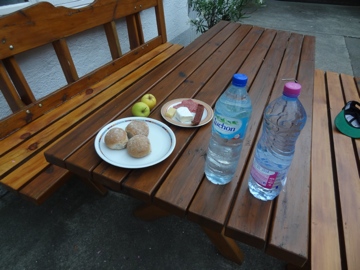 I was in a small village on a cycling road (yes, these cycling roads continued in Germany as well. I will see if I can go up to Husum following these roads). And I could see one inhabitant working in the garden. I just asked her for water. She asked me then if I was hungry. "Yes" was almost a wrong word to describe my status of that moment. Pushing behind all the wave of emotion behind, I just said yes and waited for her. She came back with plates with bread cheese sausage and ham. Whaat??
I was in a small village on a cycling road (yes, these cycling roads continued in Germany as well. I will see if I can go up to Husum following these roads). And I could see one inhabitant working in the garden. I just asked her for water. She asked me then if I was hungry. "Yes" was almost a wrong word to describe my status of that moment. Pushing behind all the wave of emotion behind, I just said yes and waited for her. She came back with plates with bread cheese sausage and ham. Whaat??
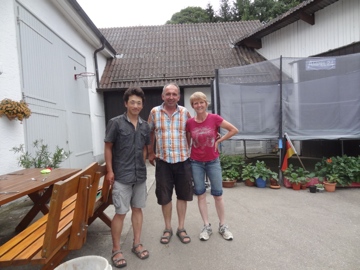 I was more than glad in that moment but she went back to the house and made scambled egg and huge German sausages (the ones that you can often see in hot dogs). Whaat?? I just dropped by for water and I ended up having a full dinner. This was really not something I would have expected from Germany!?
I was more than glad in that moment but she went back to the house and made scambled egg and huge German sausages (the ones that you can often see in hot dogs). Whaat?? I just dropped by for water and I ended up having a full dinner. This was really not something I would have expected from Germany!?
Actually she was also a cyclist and she was in the city that I had passed by just a day before. So she told me how to go to the next city, Sigmaringen. Since the weather was supposed to be rainy following day, I decided to stay in the youth hostel of Sigmaringen.
At 9pm, arrival in Sigmaringen. The youth hostel was closed. Thank you.
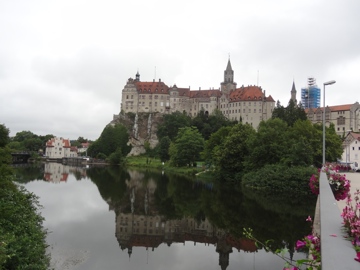 The following day was supposed to be rainy, so I decided to stay in Sigmaringen a day more (and I stayed in a hotel, which I can now do in contrast to last year :)
The following day was supposed to be rainy, so I decided to stay in Sigmaringen a day more (and I stayed in a hotel, which I can now do in contrast to last year :)
There were some tourists in the city and some touristic spots, but I mainly stayed in the hotel, partly due to the weather, but also I simply could not walk so much. Usually it takes several days to recover entirely after one week of cycling. Such a precious day :)
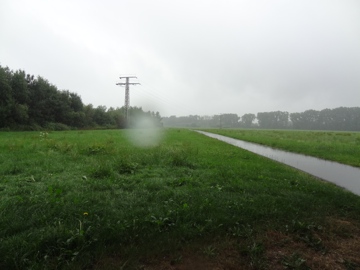 Rain. The next day was simply overshadowed. A typical problem of Germany is this continuous rain, which never is too strong, but never stops. I just had to stop every now and then for a couple of minutes. Probably my bicycle can stand it but there's also a battery charger which is connected to the dynamo of my bicycle. If it stops functionning, I cannot charge my phone on my bicycle, which is the only source of my direction. How fragile is that.
Rain. The next day was simply overshadowed. A typical problem of Germany is this continuous rain, which never is too strong, but never stops. I just had to stop every now and then for a couple of minutes. Probably my bicycle can stand it but there's also a battery charger which is connected to the dynamo of my bicycle. If it stops functionning, I cannot charge my phone on my bicycle, which is the only source of my direction. How fragile is that.
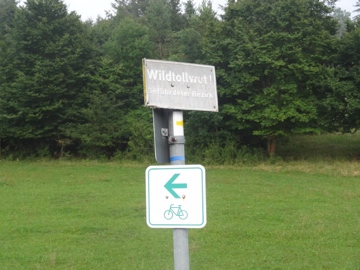 Germany is a country for cyclists, at least this is what many people say. The thing is, the people hate to see bicycles and cars at the same time. So they created bunch of cycling roads which are way longer than the normal streets. The distance between Sigmaringen and Ulm, the next big city, was around 70km according to road signs. I was also planning to reach Bamberg in two days, which was around 280km away from Sigmaringen according to Google Maps. The reality was that, there was 110km between Sigmaringen and Ulm, and about 380km between Sigmaringen and Bamberg....
Germany is a country for cyclists, at least this is what many people say. The thing is, the people hate to see bicycles and cars at the same time. So they created bunch of cycling roads which are way longer than the normal streets. The distance between Sigmaringen and Ulm, the next big city, was around 70km according to road signs. I was also planning to reach Bamberg in two days, which was around 280km away from Sigmaringen according to Google Maps. The reality was that, there was 110km between Sigmaringen and Ulm, and about 380km between Sigmaringen and Bamberg....
"Attention rabies"... Aha. Apparently it hasn't been extinct in Germany.
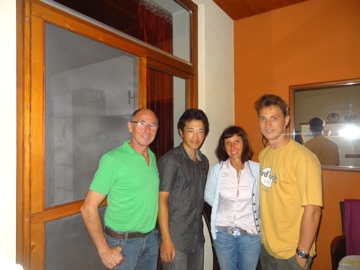 I was looking for a camping place in the evening and simply spoke to locals, who then allowed me to put my tent in their garden. Nice! They had just come back from their own vacation and I think there was a lot of stress in that moment but they also invited me for dinner. Nice! You've already seen it above but Germans are really not as complicated as they seem to be. :)
I was looking for a camping place in the evening and simply spoke to locals, who then allowed me to put my tent in their garden. Nice! They had just come back from their own vacation and I think there was a lot of stress in that moment but they also invited me for dinner. Nice! You've already seen it above but Germans are really not as complicated as they seem to be. :)
Anyway, the story of this horrible distance for bicycles was way too excruciating, which I could not stand anymore when I arrived in Ansbach, which was only 80km away from Bamberg. The problem was also, my host family of ten years ago wanted me to be there on that evening, since there were two guests from other foreign countries (Denmark and Italy, which neither I wanted to miss). So, I was in Ansbach, at 2pm. What to do?
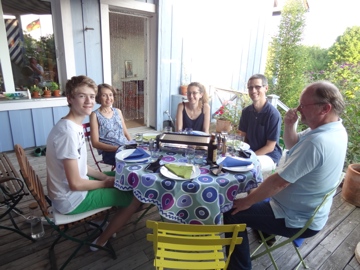 Simple. Take a train. For the first time in my life, I took a train with my bicycle in Germany, just to see that it's a horrible thing because there were too many people in the train between Nuremberg and Bamberg. Hopefully I don't need to do it anymore...
Simple. Take a train. For the first time in my life, I took a train with my bicycle in Germany, just to see that it's a horrible thing because there were too many people in the train between Nuremberg and Bamberg. Hopefully I don't need to do it anymore...
From the central station of Bamberg, I cycled through the streets I used to take 10 years ago, back home from school, for the first time since then, which will certainly be something that I will talk about during the summer course in Husum. For the first time since then, I was deep in my thought of that time. Besides, this was, to my surprise, exactly the day I arrived in Germany 10 years ago.
I certainly cannot recall precisely what I thought at that time, but vaguely I remember, that even though my daily life was strenuous, I was not in distress on the way back home. It was more like "I'll certainly do it better tomorrow". And I still think I did an adequate effort for what I was capable of. It took time and the price Germany had to pay was enormous, which I will forever be grateful for.
10 years ago, we also had dinner like here on the photo, though Till Magnus, my host brother, was tiny and I did not speak a lot. Now it changed a lot, in a positive way :)
According to Ute, my host mother, people eat raclette also in summer (probably because it's so cold in Germany). And it's also very different than in France, where people usually eat only cheese, potatoes and ham. Here, namely, there's a lot more stuff, like onion, paprika, mushrooms etc (pretty much whatever you can think of), which I think is better than in France.
There is a large river, Werra, which connected Bavaria and Hannover (?) and hence there are comfortable cycling roads. However, as always, it is pretty hard to cycle in Bavaria. I thought I would be in Göttingen, which is around 230km away from Bamberg according to Google maps, early in the afternoon two days after my departure. In the end, I arrived there late in the evening with the sun almost under the horizon, completely exhausted.
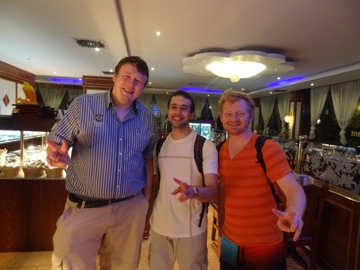 But Göttingen is Göttingen. At least I did not need to look at the map to get to Eduard's place, namely to the students' dormitory, where I used to live between 2008 and 2011.
But Göttingen is Göttingen. At least I did not need to look at the map to get to Eduard's place, namely to the students' dormitory, where I used to live between 2008 and 2011.
And of course Eduard is Eduard. I worked next to him in the computer room, although there was not much to do for me at the moment, since I had launched 1000 simulations before my departure and they will be ready mid August, but still I think I worked more than he did...
I stayed in Göttingen over the week end. It is generally a very bad idea to cycle on Sunday in Germany. We also had one party there but unfortunately it is really not easy to recover from consecutive cycling and I think I was the only one who was sleeping at midnight on the dance floor :)
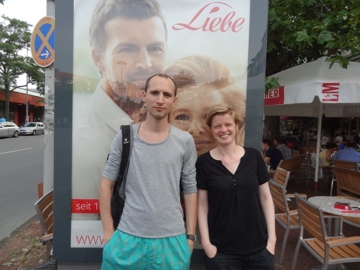 It's been 7 years since the beginning of my study in Göttingen, though not many of my friends have left Göttingen so far, which is fairly normal in Germany. One exception was this guy, Till, who actually never made others think he would get along with the study in math, which he did, successfully. Now he's almost a teacher as well as his wife in Hanover. And they've got a child. I don't know who else can make me feel so old.
It's been 7 years since the beginning of my study in Göttingen, though not many of my friends have left Göttingen so far, which is fairly normal in Germany. One exception was this guy, Till, who actually never made others think he would get along with the study in math, which he did, successfully. Now he's almost a teacher as well as his wife in Hanover. And they've got a child. I don't know who else can make me feel so old.
And probably in this context every one of you thought the girl next to him is his wife. No no. Do you remember that I was in Yazd (Iran) in January 2013? I met a girl there on train, Esther. Since she lived and worked in Hanover, I visited her for the first time since our first contact in Iran. It's been just over a year (and a half) so she cannot have changed too much, but I could not recognize her anymore because of the scarf she didn't wear.
I almost thought she hated Iran because of the inequality between men and women (guess why), however, she went there once again just a year later (and guess why).
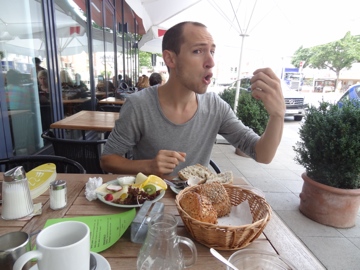 I could sleep at Till's place, which now is not a student's room, but a family's room. He behaved as before but to me it was clear that he's going to be a father. Maybe the presence of a child (even during pregnancy) changes a person, though anyway I don't think it's difficult for Till to be a good father.
I could sleep at Till's place, which now is not a student's room, but a family's room. He behaved as before but to me it was clear that he's going to be a father. Maybe the presence of a child (even during pregnancy) changes a person, though anyway I don't think it's difficult for Till to be a good father.
North of Germany is incredibly flat. The distance between Hanover and Husum on google maps was exactly what I saw in reality. Two days later, I arrived at Sarah's place (btw. this Sarah is my host. There's going to be another Sarah who is the language teacher for the American course in Husum). My cycling travel over, with 1933km in total.
In short summary, I just want to say that I was totally wrong. It was much more comfortable to talk to people in Europe and look for help, like for water or general information.
In Berlin
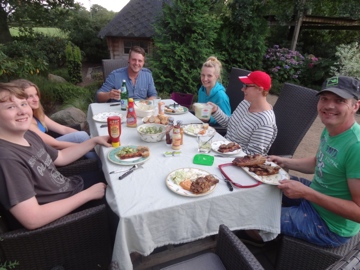 I think I was still in France, or maybe in Switzerland, when I got an email from a very old friend of mine, Shiba, saying "I'm coming to Europe on Aug. 1st." Aha?
I think I was still in France, or maybe in Switzerland, when I got an email from a very old friend of mine, Shiba, saying "I'm coming to Europe on Aug. 1st." Aha?
Since my first arrival in Germany in 2004, I was not very often in Japan. And most of my friends have already started working, making it very difficult to see them. The only one who remained was him, Shiba, since he hasn't found a job yet and we always see each other when I get back to Japan. I always told him to come to Europe, but sincerely, I didn't really think he would ever come here. And he was the only one person so far who has ever visited me here in Europe from Japan.
This misplaced photo is my family in Husum by the way :)
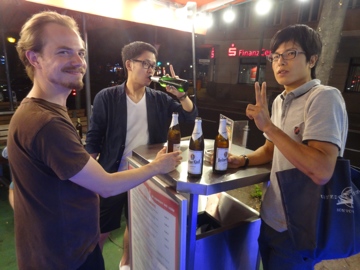 Most of the flights go to Frankfurt, but somehow they (Shiba and another friend of mine, Yuta) got a ticket for Berlin. Hm, the airports of Berlin are very famous for being horribly busy.
Most of the flights go to Frankfurt, but somehow they (Shiba and another friend of mine, Yuta) got a ticket for Berlin. Hm, the airports of Berlin are very famous for being horribly busy.
Germany is not a very expensive country but it's still better to get a place at someone's place. Luckily, Hendrik made his place available, whom I was also looking forward to seeing.
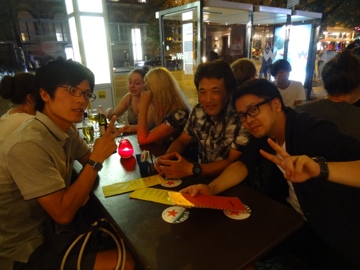 If not Amsterdam, Berlin is certainly the coolest city in Europe. At the same time, this is the city in which nothing works. The subway for example. Hendrik and I spontaneously decided to go to the airport for Shiba and Yuta, and took enough time to get there. First problem: there was a police operation in subway, whatever it means. Anyway, the subway was totally perturbed. Second problem, the shuttle bus, with the name "express bus", arrived way too late, inspite of its name...
If not Amsterdam, Berlin is certainly the coolest city in Europe. At the same time, this is the city in which nothing works. The subway for example. Hendrik and I spontaneously decided to go to the airport for Shiba and Yuta, and took enough time to get there. First problem: there was a police operation in subway, whatever it means. Anyway, the subway was totally perturbed. Second problem, the shuttle bus, with the name "express bus", arrived way too late, inspite of its name...
In the end, Shiba and Yuta had already left the airport by the time we arrived there (which was my instruction for them) and we met at the subway station near Hendrik's apartment.
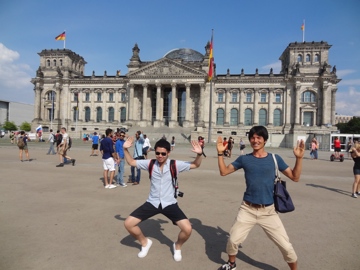 Despite the jetlag, they didn't seem to have too many problems. If you are creative enough, you may have figured out that they represent "Reichstag" on the photo, (which, unfortunately, I wasn't...)
Despite the jetlag, they didn't seem to have too many problems. If you are creative enough, you may have figured out that they represent "Reichstag" on the photo, (which, unfortunately, I wasn't...)
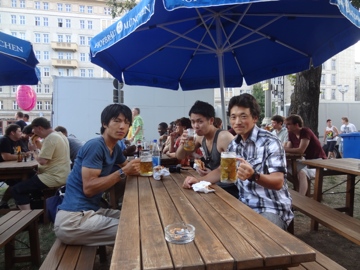 They are not students anymore, which means, the daily life goes very fast for them, especially in Tokyo. This is something that I like too in Japan, but at the same time, it is hard for me to imagine what it looks like to know only the Japanese society. And not surprisingly, they were shocked at the beer festival of Berlin which happened to be there.
They are not students anymore, which means, the daily life goes very fast for them, especially in Tokyo. This is something that I like too in Japan, but at the same time, it is hard for me to imagine what it looks like to know only the Japanese society. And not surprisingly, they were shocked at the beer festival of Berlin which happened to be there.
But this culture of "going to a beer garden after work" may be proper to Germany, because I haven't seen anything which might replace it in France and I haven't heard of anything in other countries either, even though the southern European countries are famous for festivals.
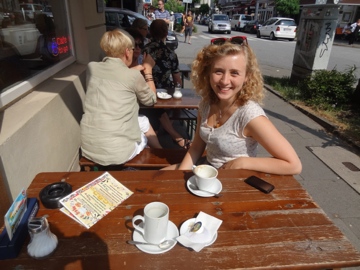 I left Berlin Sunday morning. Fortunately the railway system is less complicated in Germany than in Japan. They'll probably make it to other cities.
I left Berlin Sunday morning. Fortunately the railway system is less complicated in Germany than in Japan. They'll probably make it to other cities.
On the way back to Husum, I had lunch with Janne Lis in Hamburg. She was my host sister in Bamberg in 2004/05 and is now a student in Hamburg.
Germany has a long standing tradition of "having opinions". Therefore it's more important for them to hold discussions, even if it's not going to a conclusion. French people prefer to be more efficient and usually there's little participation, perturbation and output of students. I find it more interesting to talk with Germans, with someone like Janne Lis.
On the other hand, there's a common sense of taboos in Germany, that I like and oppose. The two main cases for me are 1. language usage with both genders being equally respected and 2. interdiction of all values during WWII. English doesn't have this first problem so much, but in German, you need the gender of a noun everywhere. These days, people often say e.g. "Mitarbeiterinnen und Mitarbeiter", to say both genders of "coworker". I'm more prone to say simply "Mitarbeiter", which is officially a masculine term. I don't really think that the usage of language would change the attitude of the person, so by saying both genders, you may still regard women contemptuously.
For the second point, I don't think all the democracy is the solution for all the countries. In countries like France or Japan for example, where there's pretty much no politics and they change the head of the state only by looking at the current state of the economy, it may be better to seize on the dictatorship. In this way, at least the politicians are likelier to do what they say.
And both points were strongly criticized by Janne Lis, which I was looking forward to and enjoyed. In this sense I was probably also quite German: people here enjoy difference of opinion. And they discuss, discuss and discuss, never reaching a conclusion. This will certainly be a very important thing that I will tell the exchange students in the coming three weeks. :)
Orientation course in Husum!
So, it has already been so stormy so far, but I've just reached the main activity of this summer vacation, YFU-orientation course in Husum!
In short, it's a course of three weeks for students from different countries (in my course there are only students from Japan) and we'll teach them the culture and the language. So it's devided into two courses: orientation course and language course. The orientation course will be held by me and consists of 2 hours a day and the other one will be held by Julia, whom I met during the preparation week end of a couple of weeks ago. (And she speaks perfect Japanese) and will be held 4 hours a day. These students will go to different places after this course, to stay one year in Germany in total.
This summer course is normally supposed to be for one nationality, but this time since our organizer was so motivated, there are two courses at the same time, namely the American one and the Japanese one. In theory they are separated but let's see what comes out of it :)
First day: Breakfast!
After the meeting of the parents a couple of weeks ago (teachers absent), they agreed upon 9am in the morning for the breakfast of the first day. We teachers wanted to be there at 8:30 to be sure that we arrive before the families. I've been living in France now for 3 years and I didn't think there'd be anyone before 9:30. It turned out that there were already a lot of people at 8:30 and at 9:00 there was no one missing --- except for me... (and I had to pay the fine of 50 cent that I was to introduce in the first lesson...)
My first impression: the American students speak extremely good German, in spite of all clichés. I just had to talk slowly and then they understand pretty much everything.
And the Japanese students? Silence... or not? No, not really, or more precisely: there were some of them who talked a lot, others maybe less. Well, the level is apparently not the same everywhere.
The host families were open minded and friendly, just I had imagined. And there was of course my concern which was the reality, a typical problem in Germany: English. The Germans have the tendency to think they should speak English whenever they talk to foreigners. For the reference, at the department of physics of the university of Göttingen English is usually spoken if there is ONE student who doesn't understand German. Sure, I know that Germans speak English, but the thing is simply, the exchange students are here to NOT speak English.
So, at the beginning of the lesson, I asked the students: how was your week end?
"Well, pretty good."
That's all? Where did you go?
"outside of Husum, but I don't know exactly where..."
That's right. This is a typical problem of teenagers. And hopefully they will be aware of their luck one day, even a couple of years later (ten years later, if they are called Sam)
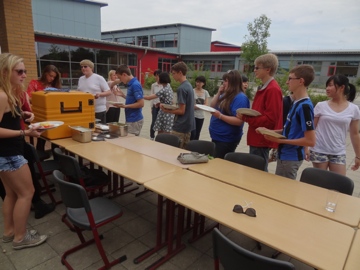 After the breakfast, I let students speak freely, in order that they can breathe again after an intensive week end with the host family.
After the breakfast, I let students speak freely, in order that they can breathe again after an intensive week end with the host family.
We had generally the problem today that there were a lot of things missing, partially because there wasn't that much stuff in the material packet. Fine, not a huge problem. I could also listen to the students better. Hier I must admit that they could get along with the German style of lesson very well, i.e. they could speak openly and ask questions. It is often very difficult for Japanese students.
Pity, that there was little communication between Americans and Japanese today. Of course it is anyway fairly difficult for them but besides there's a difference in language level (in German). I bought table tannis rackets and a volley ball afterwards. Let's see what happens then :)
After the lunch we continued with the orientation class. I asked them to write down their feelings at the farewell, departure, landing, at the first contact with the host family, etc. I collected the notes. Then they asked me, "why are we supposed to do such a strange task?" Aha, right. Since they've never made the mistake to not have written down stuff, especially kind of stuff, that they can never reproduce in their mind, like the first long stay in a foreign country, it is probably difficult for them to imagine, what it feels like afterwards, when it's too late. I'm so old meanwhile :)
That's all for the first day. There were a song book and a CD, but I really would like to have a guitar.
Tuesday, August 5
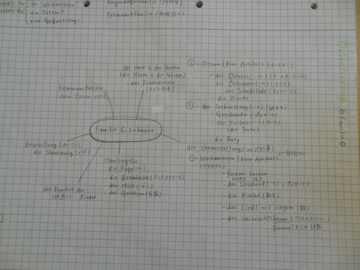 So, after the surprise of the first day, that they can actually get along with the German style lesson, I decided to propose a lot of discussions and see what happens. The subject today was "Family" (Great thanks to Miyu for her note)
So, after the surprise of the first day, that they can actually get along with the German style lesson, I decided to propose a lot of discussions and see what happens. The subject today was "Family" (Great thanks to Miyu for her note)
It is very nice, that the family constellation in Germany is pretty much like in Japan, which in turn resulted in an easy lesson today. Especially new family types like one parent or both parents of one gender don't bring any problem to them. It was more about events within family, like Christmas, Easter or birthday.
Exactly, Christmas. Exactly ten years ago I would almost have been a painful Christmas for me in Germany, when I was not so aware of the importance of Christams for German families. It is namely an event for couples in Japan in general and maybe also for small kids, who get presents from their parents, but never other way around. So the homework was to ask the host family, what they do during these events at their place.
I think the strongest shock was that they consume more than more than 3000 kcal per day during Christmas. Good luck!
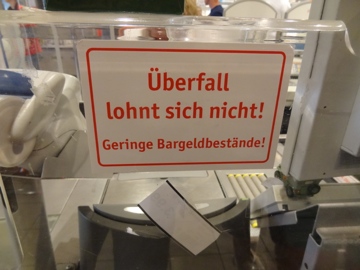 I often find it interesting, that the Germans always try to give a reason. So whenever I gave a present to someone in my host family, they were glad first (which is probably often the case in many countries) and ... tried to explain, why they were glad (which on the other hand is not always the case in France, for example). In this context here: don't break in, BECAUSE there isn't much money here (photo taken in the city center of Husum).
I often find it interesting, that the Germans always try to give a reason. So whenever I gave a present to someone in my host family, they were glad first (which is probably often the case in many countries) and ... tried to explain, why they were glad (which on the other hand is not always the case in France, for example). In this context here: don't break in, BECAUSE there isn't much money here (photo taken in the city center of Husum).
Btw. the battery charger of my camera is not working at the moment and therefore there's not so many photos until it's delivered.
Wednesday, August 6
I start with my excuse first: I have a skype meeting tomorrow in the morning for my Ph.D thesis with my boss. Preparation chaotic, but especially my thoughts were strongly disturbed.
Anyway we had the subject "School" today and at the breakfast I invited host siblings to this lesson to tell us what their school life looks like.
The exchange students by the way spoke also so much less than usual during the lesson, which was probably related to the presence of the guests. I should have thought of that... Anyway it will be important for them to get used to speak even in presence of whatever kind of nationality. (yes, for Japanese it's not that easy)
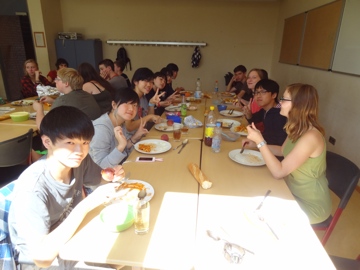 I had bought stuff for sport on Monday: Table tennis rackets, a basketball and a volleyball. Of course because I wanted them to have fun every now and then, but if they can play sports, it will certainly help them to get integrated into the life in Germany. I mean, I'm a physicist and like music and sports (and I also love to cook). All these things helped me during my bicycle trip, regardless of culture.
I had bought stuff for sport on Monday: Table tennis rackets, a basketball and a volleyball. Of course because I wanted them to have fun every now and then, but if they can play sports, it will certainly help them to get integrated into the life in Germany. I mean, I'm a physicist and like music and sports (and I also love to cook). All these things helped me during my bicycle trip, regardless of culture.
Programming solo in the afternoon... sorry kids.
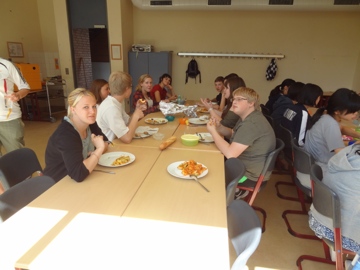 Meeting with the host parents in the evening. As I had feared, they were too concerned about the mysterious feeling of the kids. From the kids I hear the contrary, namely they are afraid of making the host parents feel uncomfortable. More communication would be helpful but probably it's still very difficult. Anyway they must understand that they are allowed to say "yes" and "no", even though the word "no" does not exist in the Japanese language. Let's see how much time they'll need to come so far (if they can ever come so far within one year...)
Meeting with the host parents in the evening. As I had feared, they were too concerned about the mysterious feeling of the kids. From the kids I hear the contrary, namely they are afraid of making the host parents feel uncomfortable. More communication would be helpful but probably it's still very difficult. Anyway they must understand that they are allowed to say "yes" and "no", even though the word "no" does not exist in the Japanese language. Let's see how much time they'll need to come so far (if they can ever come so far within one year...)
And I proposed a BBQ evening and had a good comeback. Next week on Thursday at Ren's place (or rather his host's). Bring whatever you want to eat!
Pretty much in the end of the meeting I asked them if there's someone who maybe has a guitar at home (that's not used). There was the host mother of Akane, nice!! Well, since I promised them to teach German songs to the kids, I must start thinking about it. Actually I don't know so many songs in German :)
Thursday, August 7
Finito!!! The meeting is over!
We put the orientation course to the afternoon today, due to my video conference in the morning and also because of the title of today "city rally". They had to make groups of three people, also with two friends of mine who came to Germany for the first time to see me and who of course did not speak German and therefore not being any help. Fine.
The students got the problems, that I had prepared in advance, like "go straight along the Ludsig-Nissen-street and turn at the first crossing to the right. On the left side before the next crossing is written 'Bio' on the wall of a shop. What kind of shop is it and why there's written 'Bio'?" (btw. the students could not guess the meaning of "bio" in the end, even though it appears so clear to European-language-speakers.) or also "buy a 'brezel'." wighout knowing in advance, what 'Brezel' means.
Hier they had to ask the locals to know, for example, what "Tine" is, because there's a café called Tine-café nearby. So if they don't ask them, they'd only find the café and not the original "Tine".
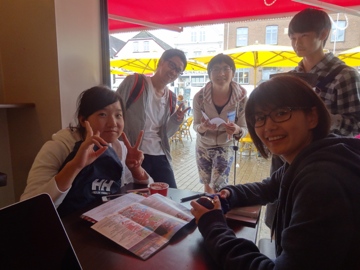 However, the problem was that there was one group which directly went to the tourist information to get a city map (which was the first task) and the person at the reception looked up all the questions on google, when the kids gave her the note with all the tasks. Well, at least they probably understood how cooperative Germans actually are ...
However, the problem was that there was one group which directly went to the tourist information to get a city map (which was the first task) and the person at the reception looked up all the questions on google, when the kids gave her the note with all the tasks. Well, at least they probably understood how cooperative Germans actually are ...
Even if the Germans were so cooperative, the weather wasn't. Every now and then we had to under go heavy shower. When it happened the first time, one group (as the same one as above) happened to be at the same café as I. Since I also wanted to order a cup of coffee, I gave 5 euros to the girls and told them they can have the change (to buy ice cream). A couple of minutes later the boys group arrived. The girls:
And so I had to buy curry wurst (sausage) for the boys...
I didn't want to have one group which manages to solve all the problems, so I put one really dodgy question:
"What is brown and runs through the forest?"
Actually in the end it turned out that my concern was not necessary because they also went shopping or bought something to eat and needed much more time. Not only they could not find the right answer for this question, but also even their host families did not understand the right answer. So what's that? (btw. it's not very clear in English but not impossible to guess...)
My students had to be in the class room at 5pm but only the boys managed it. I could collect 2.5 euros hihi :)
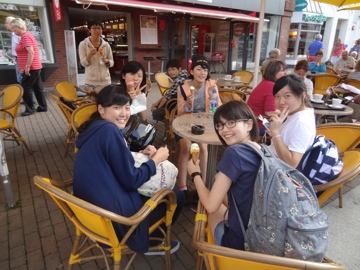 And I also tried to find the last group that I didn't buy anything for, but somehow I could find only the first two groups. Anyway this was the winner group so I bought them ice cream. At Janny's there was 5 euro or 10 euro ice. Since they were three girls, I was holding 50 euro in the hand. Ren had secretly also ordered one (I didn't notice first) and I had one coffee. Altogether I got 40 euros back. ???
And I also tried to find the last group that I didn't buy anything for, but somehow I could find only the first two groups. Anyway this was the winner group so I bought them ice cream. At Janny's there was 5 euro or 10 euro ice. Since they were three girls, I was holding 50 euro in the hand. Ren had secretly also ordered one (I didn't notice first) and I had one coffee. Altogether I got 40 euros back. ???
The girls told me "we didn't want to be trouble for you". Aha. It would haven't been a trouble for 30 euros but fine, it is still nice that they think of me. :)
Friday, August 8
Communication. I probably don't need to say how important it is. Especially it is difficult to get by without it, if you want to work with someone else. So, the first task of the day was to hold one pen with another person and to draw different pictures, namely following objects: circle, house, tree and dog, whereas they were not allowed to communicate while doing so, though probably it did not make a big difference anyway since the Americans and the Japanese worked together. The point of this introduction was to recognize the importance of communication in order to achieve something. I had feared that they would say something like "why do we have to such a task?" like the essay of the first day.
Both the sense the exercise and my fear turned out to be wrong. The reality was that there was one dominant person who draw the pictures while the other person was simply holding the tip of the pen. They could draw good pictures this way. The sense of the task was anyway not so important for them because they had so much fun with that.
Then we said good bye to the Americans and I gave them a group work. The students had to say sentences with emotion, e.g. "I have to see my dentist this afternoon." or "We have BBQ next Thursday." There was also a phrase "I saw a girl who ate even more than Sarah." It was interesting to see the students observing Sarah during the lunch. :)
After the lunch we played basketball, volleyball and table tennis. All the Japanese were outside but only one American. There were more before the lunch but I heard later on that there was a passionate discussion over the abortion. Nice that this problem is less complicated for Japanese...
So, the first week is over. Concerning my classes there was a strong contrast between before and after my meeting on Thursday with my boss. Anyway my students had so much fun. I hope it will continue like that. :)
First weekend
Originally I wanted to go to Lübeck this week end but the weather was simply too miserable and I had too much to do.
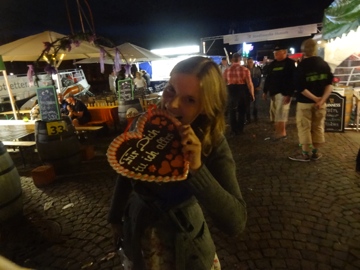 But there was the harbour festival of Husum at the same time. In principle this is a normal local festival. Hopefully the students could participate in it, too (is also much more authentic than Oktoberfest for example).
But there was the harbour festival of Husum at the same time. In principle this is a normal local festival. Hopefully the students could participate in it, too (is also much more authentic than Oktoberfest for example).
According to my host family, it was pretty much the only one big event in Husum in a whole year. I just wonder what young people usually do in this small city otherwise...
Unfortunately almost all the time I had to work so essentially I could see the stuff in the evening. There was a cover band of chili peppers which had a concert. cool.
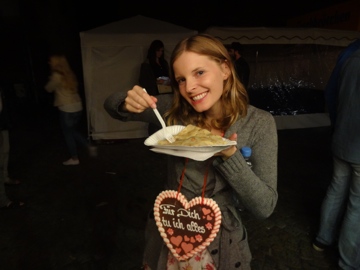 I put here a couple of photos of Sarah, eating, in order to support my comments of last Friday :)
I put here a couple of photos of Sarah, eating, in order to support my comments of last Friday :)
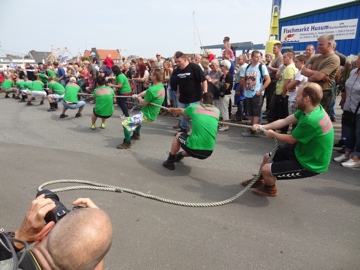 I think I've been well integrated into the German culture, but I don't think there'd be a successful story of eating habitude. I name don't think, I would ever be able to eat as much as the girls here. Hopefully my students will manage it :)
I think I've been well integrated into the German culture, but I don't think there'd be a successful story of eating habitude. I name don't think, I would ever be able to eat as much as the girls here. Hopefully my students will manage it :)
... and a great thanks to the hosts of Sarah, who let me drink a couple of liters of beer (how bold of me... though I still managed to go back home by bicycle). On Monday I will tell my students how to get along with alcohol. They've already got a counter example :)
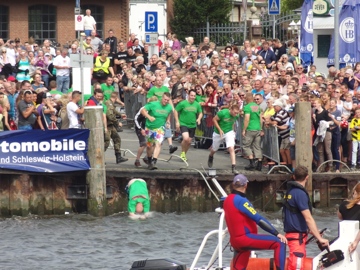 The highlight of the festival (allegedly) was the tug of war. The rule is though in Husum a bit merciless: They stand on the both sides of the dock, and pull the rope. The losers must spring into water then (logically enough). In practice though the winners also spring into water.
The highlight of the festival (allegedly) was the tug of war. The rule is though in Husum a bit merciless: They stand on the both sides of the dock, and pull the rope. The losers must spring into water then (logically enough). In practice though the winners also spring into water.
The nephew of Sarah (my host. Unfortunately we've got several Sarah at the moment here) also participated in it. But usually it's whether the military or the shepherds. Somehow it sounds logical...
As you can see here from this guy in black, they are quite serious. It is anyway impressive to see burly German guys screaming each other...
The team of Sarah's nephew, Philip, also had to spring into water (cf. photo).
I heard that they weighed 1500kg with 8 persons, the team of shepherds. wow
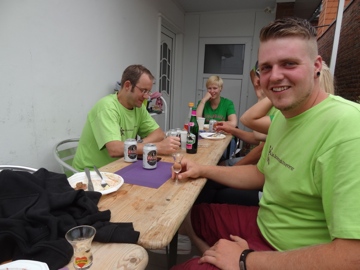 I was also invited to the BBQ after the tug of war. Can you see the beer on the table? It's a Danish beer that I have never liked in my life, but probably never as little as in this moment. I don't know why I was looking forward to it when I was in France...
I was also invited to the BBQ after the tug of war. Can you see the beer on the table? It's a Danish beer that I have never liked in my life, but probably never as little as in this moment. I don't know why I was looking forward to it when I was in France...
Btw. the charger of my camera arrived! Yahoo!!!
Monday August 11
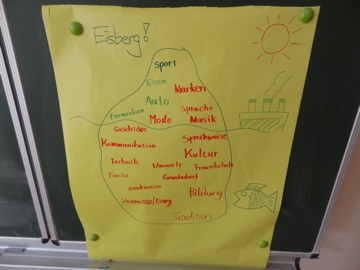 This is the main theme of the whole OSK: Eisberg model. There are things in foreign cultures that you can simply see from outside, like for example meals or cars. However, there are much more stuff that you cannot see directly. E.g. tradition or estimation of values in general. This illustration was supposed to be there at the beginning of the course but I had completely forgotten about it.
This is the main theme of the whole OSK: Eisberg model. There are things in foreign cultures that you can simply see from outside, like for example meals or cars. However, there are much more stuff that you cannot see directly. E.g. tradition or estimation of values in general. This illustration was supposed to be there at the beginning of the course but I had completely forgotten about it.
The colors were determined by the word gender. Did you know that these terms often are feminine in German? (not only in German and I knew that beforehand so I had warned my students, too)
The subject of today was culture. For the introduction we had this picture and then aYoutube video, which is about possible wrong interpretation of a culture by outsiders.
In this context, it might be difficult for Japanese to understand the way Germans (and Europeans in general) deal with jokes. For example people in France tell a joke like "How do you say shorts in Japanese? - Sakakaka (=sac à caca)". People in Japan will probably feel embarrassed by this, though maybe now it's a little bit different because change of mentality can be seen for example through Hetalia.
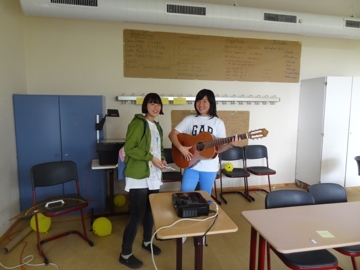 Now looking back this moment actually I don't know anymore how I came to the idea to give them this task but the students had to talk about the week end, while they had different conditions like "speak as silently as possible" or "always agree with your partner". I also could hear what they did. So nice that the host families did so much effort to give beautiful memories to the students.
Now looking back this moment actually I don't know anymore how I came to the idea to give them this task but the students had to talk about the week end, while they had different conditions like "speak as silently as possible" or "always agree with your partner". I also could hear what they did. So nice that the host families did so much effort to give beautiful memories to the students.
I had promised to the host families at the meeting on last Wednesday, that I would teach German songs to the children. In order to follow my promise, I chose two songs "An der Nordseeküste" and "Schön ist es auf der Welt zu sein". Maybe there'd be one day where they can sing it for us :)
Tuesday, August 12
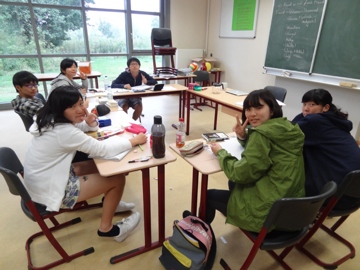 Rei was absent today (as yesterday). Her host mother told me she had stomach ache. Where did it come from? (And I also had often stomach ache at first in my first year in Germany. It was apparently because of cheese, which quite quickly I got used to.)
Rei was absent today (as yesterday). Her host mother told me she had stomach ache. Where did it come from? (And I also had often stomach ache at first in my first year in Germany. It was apparently because of cheese, which quite quickly I got used to.)
Title of the day: friends. I started the class by looking for synonyms of "friend", because this word is not very easy for Japanese to use. The easiest way is to put it as "mein Freund (=my friend)", which unfortunately means "my boyfriend" in German and if you say "ein Freund von mir (=a friend of mine)", which is a neutral expression, you have to decline twice, namely "ein" and "mir".
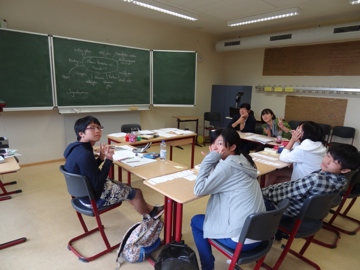 In addition, I guess teenagers (especially boys) don't say often "Freund" but more like "Kumpel", "Kommilitone" or "Kollege", which all mean something like "friend". My students eventually will have to understand all of these terms :)
In addition, I guess teenagers (especially boys) don't say often "Freund" but more like "Kumpel", "Kommilitone" or "Kollege", which all mean something like "friend". My students eventually will have to understand all of these terms :)
Then we wrote down, when we actually need friends, which I did to make them think of what may be a clue to find friends (cf. black board, if you understand German). Then I asked them too, what they want to do with their friends when they move to their new families. Shopping, going to café, doing homework together. Hm, it is really nice that they have so many ideas, but I'm not sure if it's clear to them, how complicated the linguistic problem can be for them. (though I had similar imaginations when I arrived in Germany. Well, doesn't matter how complicated it is. Just don't give up, it'll always be sunny after heavy rain!)
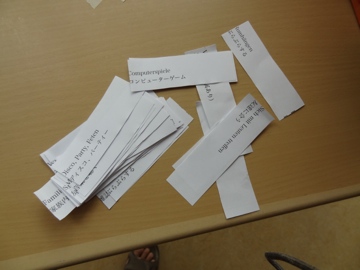 A big problem that the students will certainly be confrontated with will be the activity after school, because it is normal in Japan to stay at school even after the class to do other stuff, e.g. sports, music, art, board games etc. I was in the swimming club and in principle I was there everyday (even on weekends). And they usually don't need to wonder how they can spend time after school. In Germany the system is a little bit different. Before, the children get lunch at home after the school and they usually went to the market place, which is usually in the city center (or maybe some children also partially stayed at home to read books or so?). The time has drastically changed and already ten years ago most of the kids simply went back home to play computer games.
A big problem that the students will certainly be confrontated with will be the activity after school, because it is normal in Japan to stay at school even after the class to do other stuff, e.g. sports, music, art, board games etc. I was in the swimming club and in principle I was there everyday (even on weekends). And they usually don't need to wonder how they can spend time after school. In Germany the system is a little bit different. Before, the children get lunch at home after the school and they usually went to the market place, which is usually in the city center (or maybe some children also partially stayed at home to read books or so?). The time has drastically changed and already ten years ago most of the kids simply went back home to play computer games.
Here activities in free time on the photo, which my students had to guess and put in order according to a recent ranking in Germany. They apparently really didn't think that "to surf in the internet" was the first place...
I had indirectly asked the host siblings to answer some questions on this subject. Fortunately there were the host sisters of Ren who answered the important one: "How much money do you need for your free time activities?" And then I asked the students how they are going to balance it for the exchange year. Apparently no one has a financial limit, i.e. they get money whenever they need. In my case 10 years ago my mother told me the limit would be 100 euros per month. Later on she changed her mind and said I could get as much as I needed, though out of false pride I didn't want to surpass the limit and also for the reason that 100 euro was so much money at that time. Now, getting 45 euro per hour for the courses I give at the university, I should have recognized how important it was to learn something and my decision appears to me so absurd. So I just hope that my students will not make the same mistake and they will not spoil their exchange for such a ridiculous reason.
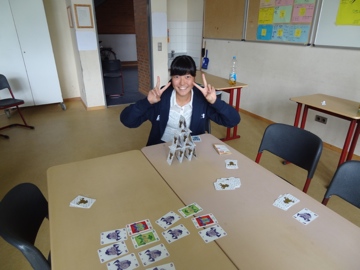 Then I changed the subject to talk about alcohol consumption by watching a Youtube video. Apparently YFU Japan tells the students that alcohol was forbidden wherever they go for the entire exchange year. Sincerely, YFU Japan sometimes makes rules that distort a normal life in a foreign country. I simply followed the instructions of YFU Germany, i.e. to consume alcohol in a reasonable amount, since it's not forbidden for those over 16 to drink beer and wine in Germany. Anyway I didn't get the impression that they would drink immensely since they did not appear to be so excited to hear it. I thought teenagers were always glad to be allowed to drink alcohol, or were they distinctly?
Then I changed the subject to talk about alcohol consumption by watching a Youtube video. Apparently YFU Japan tells the students that alcohol was forbidden wherever they go for the entire exchange year. Sincerely, YFU Japan sometimes makes rules that distort a normal life in a foreign country. I simply followed the instructions of YFU Germany, i.e. to consume alcohol in a reasonable amount, since it's not forbidden for those over 16 to drink beer and wine in Germany. Anyway I didn't get the impression that they would drink immensely since they did not appear to be so excited to hear it. I thought teenagers were always glad to be allowed to drink alcohol, or were they distinctly?
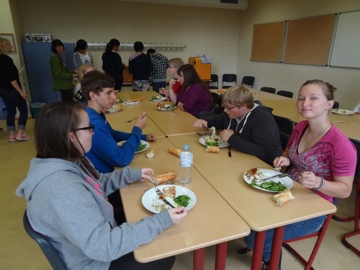 So in order to continue the discussion "How to find a friend at the beginning of the year (while still not being able to speak German)", we wrote down a list of things that they can do without language: Sports, music... Anywathing else? The thing is, Japanese do not come up with this idea, because it doesn't really exist in Japan: Board game. Germany is actually the country of board games in Europe so they will certainly often see it. However, I didn't think that it would burst such an excitement when I showed them a card game '6 nimmt' to tell them what it is like... (though it was raining outside so there was nothing to do otherise, too).
So in order to continue the discussion "How to find a friend at the beginning of the year (while still not being able to speak German)", we wrote down a list of things that they can do without language: Sports, music... Anywathing else? The thing is, Japanese do not come up with this idea, because it doesn't really exist in Japan: Board game. Germany is actually the country of board games in Europe so they will certainly often see it. However, I didn't think that it would burst such an excitement when I showed them a card game '6 nimmt' to tell them what it is like... (though it was raining outside so there was nothing to do otherise, too).
Actually I had never written it here, but in general we have this problem that we get too much for the lunch. If the host siblings can pass by, they are really welcome.
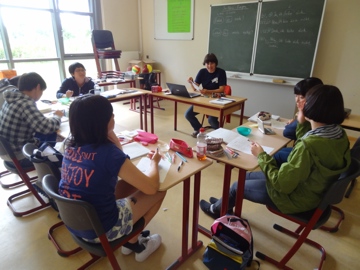 Also a photo from Julia's class (language class). She usually speaks German and only every now and then Japanese, although her Japanese is almost perfect. I find it also nice because it shows the future reality of the students to them that we want them to know :)
Also a photo from Julia's class (language class). She usually speaks German and only every now and then Japanese, although her Japanese is almost perfect. I find it also nice because it shows the future reality of the students to them that we want them to know :)
You can see on the black board "Yes/no questions" and "Do you love me?" - "No, I don't"... It is somewhat also pretty German that people treat such a phrase bluntly as an example :)
Wednesday, 13. August
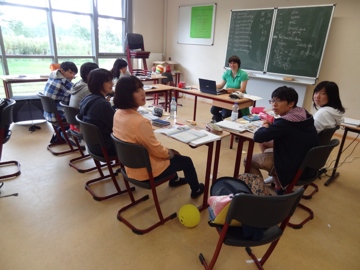 My course was to be in the afternoon so I arrived just before noon. Julia was teaching.
My course was to be in the afternoon so I arrived just before noon. Julia was teaching.
First impression: quiet. Hm. But since I had to work on my Ph.D thesis, I could not really take attention to it.
There was Sarah in the spare room, who was correcting excercises and was delighted by every funny mistake.
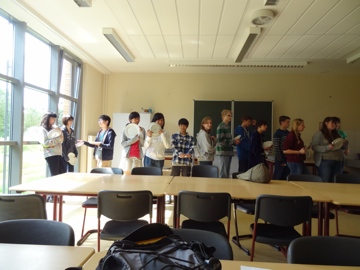 The relation between American and Japanese students hasn't changed so much until now. The this is simply that this OSK is probably a special period for them, in which they do not do so much effort for anything particular, but they simply spend time to get used to the German life. I hope they are still aware of being responsible for the organization of the farewell party.
The relation between American and Japanese students hasn't changed so much until now. The this is simply that this OSK is probably a special period for them, in which they do not do so much effort for anything particular, but they simply spend time to get used to the German life. I hope they are still aware of being responsible for the organization of the farewell party.
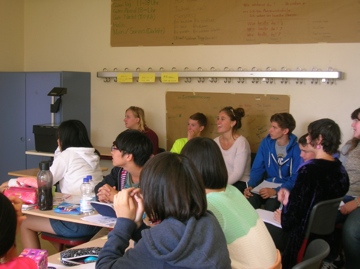 Of course they don't always have to communicate verbally. Hier, for example, we sang together again, this time with everyone. I knew that Japanese sing a lot, but the Americans also seemed to like to sing. And even it was the Americans who wanted to sing more in the end.
Of course they don't always have to communicate verbally. Hier, for example, we sang together again, this time with everyone. I knew that Japanese sing a lot, but the Americans also seemed to like to sing. And even it was the Americans who wanted to sing more in the end.
We had the subject "adaptation". Since the lunch arrived pretty late and we also sang, we did not have so much time anymore. Besides it was so ambiguous and was anyway impossible to clearly distinguished it from other subjects. So, I decided to discuss how to give a presentation in Germany.
So I took a subject that came to my mind in this moment: "Manga" and tried to develope new ideas. First problem: the students first wanted to come to the conclusion. For them a presentation is supposed to start with an introduction, go further with pro and con, and have a clear conclusion. So I had explain to them that it's a simple relaying of information if the title is something like manga.
Fine, new start. What can we talk about? "Different genres of manga!". Well, yes that's correct, but I think the biggest problem for Japanese is that they always try to say something striking and not what may seem to be trivial.
In this sense a lot of people make the same mistake. If I take my Ph.D. thesis in theoretical physics as an example, most of people imagine something very complicated, especially when they see my simulation code. Fine, it looks complicated, but do you know that it merely consists of different combination of addition and multiplication? And this is valid for all simulation codes? We, physicists, make only such simple things to create liquide on the computer screen or in my case, to simulate the ageing of steels.
So, one more time. Promptly there were the first words describing manga. I write them on the black board. Quite chaotic, but it's not a problem. If you have many elements, it is not difficult to put them together afterwards.
A couple of minutes later, the black board was still half empty. "There isn't anything anymore." Sure there still is. Then there was one phrase that I hear every now and then at the university: "You've chosen a particularly difficult subject."
In der Fakultät für Physik der Universität Göttingen sind in meinem Jahrgang angeblich mehr als 90% der Studenten rausgeflogen oder haben mehr als Regelstudienzeit gebraucht. In meiner Umgebung waren auch ganz viele Leute. Ein großer gemeinsamer Punkt: Begründen, dass es normal ist, dass sie die Aufgaben nicht hinkriegen können.
Als ich noch klein war, haben mir meine Eltern immer gesagt "du hast ja wirklich immer nur die besten Lehrer!". Die Qualität der Lehrer in Japan ist sehr gut, aber im Nachhinein denke ich, dass nicht unbedingt alle so gut waren, aber in meinen unreifen Augen waren sie immer perfekt und habe nie gezweifelt. Ich finde es hin und wieder mal schade, dass manche Eltern Lehrer kritisieren, weil die Kinder es ja danach nicht mehr so ernst nehmen, und dadurch eine wichtige Möglichkeit verlieren, was aber natürlich heutzutage überall auf der ganzen Welt zu sehen ist.
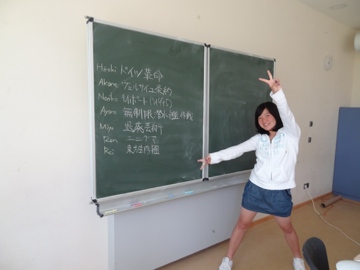 Jedenfalls habe ich alles so akzeptiert, auch wenn ich ein schrecklicher Schüler war der ab und zu im Schulknast saß. Das alles hat mich so abgehärtet dass ich, wenn ich nun in der Uni an der Tafel vor den ganzen Studenten stehe, mit einer Kreide in der Hand und nix Anderes stehe. Ich mache nicht einmal eine Notiz dafür. Im Prinzip ist es eine Tafelpräsentation von 90 Minuten die ich jede Woche halte und ab und zu erinnere ich mich, wie schwer es mir früher fiel. Jedenfalls habe ich damals alles getan. Hat sich unglaublich gelohnt, aber echt unglaublich...
Jedenfalls habe ich alles so akzeptiert, auch wenn ich ein schrecklicher Schüler war der ab und zu im Schulknast saß. Das alles hat mich so abgehärtet dass ich, wenn ich nun in der Uni an der Tafel vor den ganzen Studenten stehe, mit einer Kreide in der Hand und nix Anderes stehe. Ich mache nicht einmal eine Notiz dafür. Im Prinzip ist es eine Tafelpräsentation von 90 Minuten die ich jede Woche halte und ab und zu erinnere ich mich, wie schwer es mir früher fiel. Jedenfalls habe ich damals alles getan. Hat sich unglaublich gelohnt, aber echt unglaublich...
Natürlich hätte ich mir das alles damals nicht vorstellen können und es ist ja irgendwo normal, dass die Schüler darauf so reagieren. Hoffentlich machen sie das trotzdem so mit. Nach jeder Hürde wird es immer besser, nur es ist schwer zu erkennen.
So, Stichwörter aufgeschrieben, die Reihenfolge bestimmt. Einer muss vortragen. Ich höre "woa, ich bin in so was echt schlecht." Ja, ich weiß. :) Rei verliert Stein Schere Papier, geht auf Toilette und kommt nicht zurück... Vorher habe ich noch mal versichert, dass der Vortrag ein ziemliches Ablesen der Stichwörter ist, d.h. man muss sie einfach nur durch Sätze verbinden. Na ja, vielleicht ging es ihr noch nicht so gut da wo sie bis gestern Bauchschmerzen hatte...
Sie hat es aber zugegebenermaßen ganz gut vorgetragen. Jedenfalls haben sie gesehen, wie man eine Präsentation hält (und es gibt eh nicht "richtig" oder "falsch". Man hält sie, Punkt!).
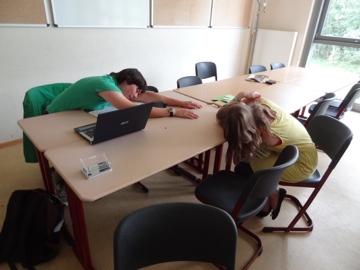 Ich habe noch ein anderes Thema "Tokio" ausgesucht aber dafür hatten wir nicht genug Zeit. Jedenfalls machen wir übermorgen die Einheit "Geschichte" und jeder muss einen Vortrag von 5 Minuten halten, über folgende Themen: Novemberrevolution, Friedensvertrag von Versailles, U-Boot, Unbeschränkter U-Boot-Krieg, Entartete Kunst, Enigma, Lebensraum im Osten. Jeweils gibt es einen Wikipedia-Artikel (Ich weiß, dass das wissenschaftlich nicht akzeptabel ist, aber es geht darum, dass sie irgendwas vortragen) auf Japanisch. (Ich habe übrigens absichtlich etwas unbekannte Terme genommen, die aber teilweise mit dem Ausflug verbunden sind.)
Ich habe noch ein anderes Thema "Tokio" ausgesucht aber dafür hatten wir nicht genug Zeit. Jedenfalls machen wir übermorgen die Einheit "Geschichte" und jeder muss einen Vortrag von 5 Minuten halten, über folgende Themen: Novemberrevolution, Friedensvertrag von Versailles, U-Boot, Unbeschränkter U-Boot-Krieg, Entartete Kunst, Enigma, Lebensraum im Osten. Jeweils gibt es einen Wikipedia-Artikel (Ich weiß, dass das wissenschaftlich nicht akzeptabel ist, aber es geht darum, dass sie irgendwas vortragen) auf Japanisch. (Ich habe übrigens absichtlich etwas unbekannte Terme genommen, die aber teilweise mit dem Ausflug verbunden sind.)
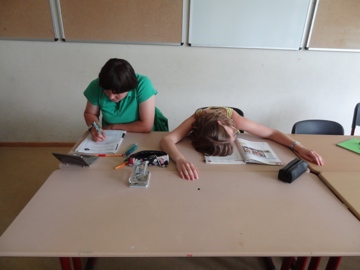 Im Nebenraum waren zwei Leichen.
Im Nebenraum waren zwei Leichen.
Da habe ich erst erfahren, dass die beiden Sprachlehrerinnen, Julia und Sarah, es so schwer fanden, die Schüler zu motivieren. Sarah hat anscheinend das gleiche Problem momentan und versucht, die interkulturelle Pädagogik anzuwenden. Woaaa
Jedenfalls ist es mir nicht sonderlich aufgefallen in meinem Unterricht, aber na ja, innerhalb von gut einer Woche lernen sie ja schon so viel. Es tut mir bloß etwas leid weil ich weiß wie viel Zeit Sarah und Julia nehmen für die Schüler um den Unterricht vorzubereiten (im Gegensatz zu mir).
Donnerstag, 14. August
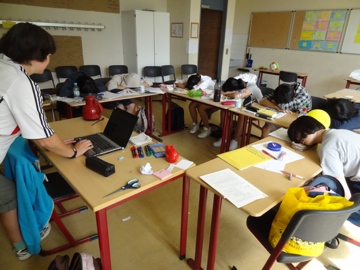 Zu meinem Unterricht habe ich nichts zu sagen. Einfach nur erklärt, wie YFU funktioniert und was sie alles dieses Jahr haben werden. Ayano fragte mich, ob das Mittelseminar obligatorisch sei. Nein, ähnlich wie das Austauschjahr an sich. Aber sie werden es brauchen.
Zu meinem Unterricht habe ich nichts zu sagen. Einfach nur erklärt, wie YFU funktioniert und was sie alles dieses Jahr haben werden. Ayano fragte mich, ob das Mittelseminar obligatorisch sei. Nein, ähnlich wie das Austauschjahr an sich. Aber sie werden es brauchen.
Man sieht deutlich, dass die Motivation der Schüler fatal nachgibt. Julia ändert hin und wieder mal flexibel ihre Unterrichtsplanung. Ich, auf der anderen Seite, ziehe es durch, zum einen weil es bei mir mehr Diskussion gibt und die Schüler mitdenken müssen, zum anderen auch weil sich Julia verantwortlich fühlt. So eine typische gute deutsche Lehrerin.
Als ich im OSK war, sind wir zu einem Vergnügungspark gefahren, was der Orientierungslehrer von damals vorgeschlagen hat. Diesmal, als Orientierungslehrer, hatte ich beim Elternabend vorgeschlagen zu grillen.
Es war auf jeden Fall schön schon im Unterricht zu sehen, wie sehr sich die Schüler darauf gefreut haben (Letztendlich sind wir dafür da). Eigentlich wollten wir noch schwimmen gehen aber es war einfach zu kalt. (Die Schüler sind dafür direkt dahin gefahren)
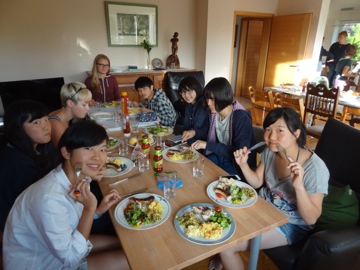 Und wenn ich sage, "ich habe es organisiert" ist es so was von falsch, da sich Familie Kiehne (die Gastfamilie von Ren) hundertprozentig dafür geopfert und gleich fast 30 Leute aufgenommen hat. Einen großen Dank noch mal dafür :) (Und sie hatten die anderen Familien auch kontaktiert wegen der Adresse und der Teilnehmeranzahl etc. So viel Aufwand und so wenig Mitwirkung von mir...)
Und wenn ich sage, "ich habe es organisiert" ist es so was von falsch, da sich Familie Kiehne (die Gastfamilie von Ren) hundertprozentig dafür geopfert und gleich fast 30 Leute aufgenommen hat. Einen großen Dank noch mal dafür :) (Und sie hatten die anderen Familien auch kontaktiert wegen der Adresse und der Teilnehmeranzahl etc. So viel Aufwand und so wenig Mitwirkung von mir...)
Wie üblich bin ich einfach mal so 45 Minuten zu spät angekommen, weil für mich 18 Uhr viel zu früh war und ich dachte so, da käme niemand vor 18:30. Ich war der Letzte.
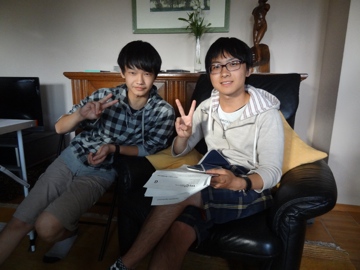 In Japan ist es übrigens üblich, dass man direkt am Grill ißt. Es ist zwar nicht sonderlich schwierig den deutschen Grill anzunehmen aber es war denke ich auch ein gutes Erlebnis für sie (und man grillt ja so gerne in Deutschland). Für diejenigen die sich für den traditionnellen japanischen Grill interessieren, hier die Referenz. Man bekommt normalerweise so ein Zeug zu dritt oder viert, und man isst direkt davor. Praktisch nich?
In Japan ist es übrigens üblich, dass man direkt am Grill ißt. Es ist zwar nicht sonderlich schwierig den deutschen Grill anzunehmen aber es war denke ich auch ein gutes Erlebnis für sie (und man grillt ja so gerne in Deutschland). Für diejenigen die sich für den traditionnellen japanischen Grill interessieren, hier die Referenz. Man bekommt normalerweise so ein Zeug zu dritt oder viert, und man isst direkt davor. Praktisch nich?
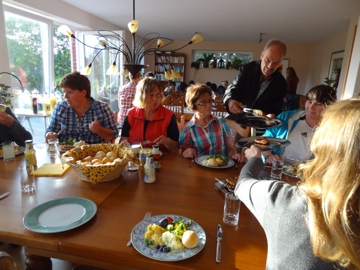 Und nebenbei war es bestimmt schön für sie zu sehen wie groß ein typisch deutsches Haus sein kann. Ich persönlich komme aus Tokyo und wir hatten ziemlich gar keinen Garten, was in Japan relativ normal ist.
Und nebenbei war es bestimmt schön für sie zu sehen wie groß ein typisch deutsches Haus sein kann. Ich persönlich komme aus Tokyo und wir hatten ziemlich gar keinen Garten, was in Japan relativ normal ist.
An den drei Reihen von Tischen haben sie die Kinder (mit ihren Gastgeschwistern) und ihre Gastfamilien getrennt. Dies führte dazu, dass sich die Gastfamilien austauschen konnten. Anscheinend was es generell so, dass ihre Erlebnisse mit den Austauschschülern recht ähnlich waren.
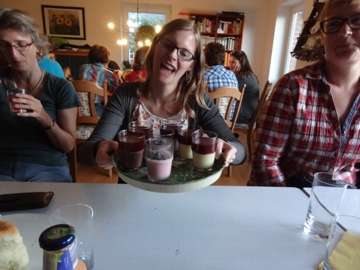 Ich persönlich hatte ein Gespräch mit der Gastmutter von Hiroki, was er so zuhause macht usw., weil er nämlich während meines Unterrichts nicht viel redet, obwohl er eigentlich schon recht viel kann. Er redet anscheinend auch nicht viel zuhause, aber er hat zumindest versucht, ihnen den japanischen Schach beizubrigen. Leider ist das Spiel recht kompliziert und hat es nicht geschafft, aber irgendwie erinnert es mich an mich von vor 10 Jahren.
Ich persönlich hatte ein Gespräch mit der Gastmutter von Hiroki, was er so zuhause macht usw., weil er nämlich während meines Unterrichts nicht viel redet, obwohl er eigentlich schon recht viel kann. Er redet anscheinend auch nicht viel zuhause, aber er hat zumindest versucht, ihnen den japanischen Schach beizubrigen. Leider ist das Spiel recht kompliziert und hat es nicht geschafft, aber irgendwie erinnert es mich an mich von vor 10 Jahren.
Sarah wollte viel essen.
Während Sarah noch weitergegessen hat, war es den Kindern irgendwann langweilig. Die sind alle nach draußen gegangen und haben angefangen zu spielen. Ich war auch da um Fotos zu machen (ich bin der Japaner!) und musste auch mitspielen. Ich bin viel zu alt für so was...
Da mussten sie einfach viel rennen rennen und rennen. Ich mochte auch gerne zu rennen aber da wo ich etwa 2 Wochen einfach nur Fahrrad gefahren bin und jetzt jeden Tag schwimme, sah ich bestimmt nicht mehr so geschickt aus. Hiroki hat mich erwischt. Er wird morgen sehen, was er nicht hätte tun sollen :)
Danach sind wir alle zum Meer gegangen. 1 und 2 und 3 und ... 10 ein Hut ein Stock ein Regenschirm... Hoffentlich werden die Schüler nicht vergessen was sie auf dem Weg gelernt haben.
Das Wattenmeer war auch schön in der Abenddämmerung. Wir sind einfach auf den Steg gegangen und haben ein bisschen gequatscht, bis irgendeine Gastmutter angerufen hat. Ich hatte selber so viel Spaß damit, aber hoffentlich bleibt es in Erinnerung bei den Schülern :) (und hoffentlich auch bei den Gastgeschwistern). Und vor allem dass es eine gute Erfrischung war für die Schüler.
Freitag, 15. August
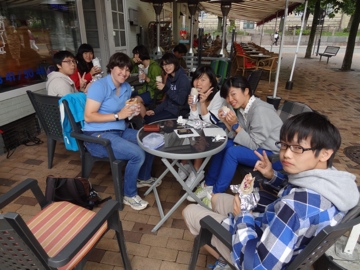 Morgens hatte ich ein Gespräch mit meinem Chef. Er hat gemeckert. Na und?
Morgens hatte ich ein Gespräch mit meinem Chef. Er hat gemeckert. Na und?
Zu Mittag sind wir Döner essen gegangen. Die Schüler hatten schon (vor heute) Döner und mir schmeckt das Ding nicht, aber es war trotzdem schön mal in der Stadt zu sein. Es war bestimmt auch einfacher für Julia, durch Einkaufen den Schülern Zahlen beizubringen (und somit mussten sie auch andere Sachen kaufen. Ich hab von Miyu eine Tüte Haribo bekommen :)
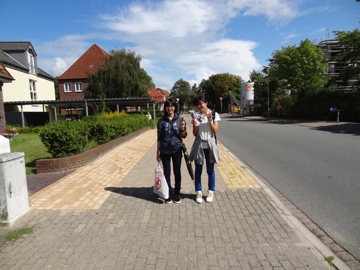 Heute hatten wir "Geschichte". Ich glaube für die Japaner heißt Geschichte einfach langweiliges Auswendiglernen von Jahreszahlen und Namen. Und wenn ich mich richtig erinnere, haben wir jedes (Schul-)jahr 2000 Jahre Geschichte gelernt. In Deutschland werden sie sehen, wie klein der Zeitraum ist, der innerhalb eines Schuljahres behandelt wird.
Heute hatten wir "Geschichte". Ich glaube für die Japaner heißt Geschichte einfach langweiliges Auswendiglernen von Jahreszahlen und Namen. Und wenn ich mich richtig erinnere, haben wir jedes (Schul-)jahr 2000 Jahre Geschichte gelernt. In Deutschland werden sie sehen, wie klein der Zeitraum ist, der innerhalb eines Schuljahres behandelt wird.
Am Anfang des Unterrichts hatten wir einige Referate, die ich denen gestern aufgegeben hatte. Die Themen waren hauptsächlich mit dem Ausflug von morgen verbunden. Miyu war die erste und hat zum Thema "Entartete Kunst" gesprochen. Mein Eindruck: perfekt... Sie hat nicht nur die wichtigsten Informationen weitergegeben, sondern auch darauf geachtet, dass es sich um eine "mündliche Präsentation" gehandelt hat, und sie hat somit auf fachliche Terme verzichtet, in diesem Fall zum Beispiel die Namen der Künstler. Es ist sogar für Studenten nicht sehr einfach, so was zu vermeiden. Sonst waren Hiroki und Noriko daran. Bei Hiroki war es etwas kurz aber bei Noriko konnte man sehen, dass sie das Thema sehr gut verstanden hatte. Insgesamt würde ich aber behaupten, dass sie sich auf diese Weise sehr gut im deutschen Schulsystem durchsetzen können.
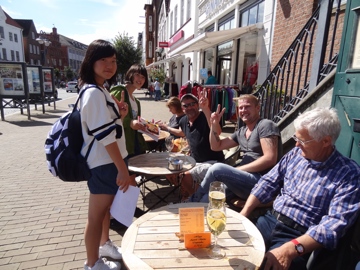 Damit aber die Schüler wissen, wie wichtig die Geschichte ist für die Deutschen, habe ich den Schülern einfach mal einen Zettel gegeben, um den Einheimischen Fragen zu stellen (das waren immer historische Bilder die sie teilweise gar nicht kannten und sie mussten herausfinden, was sie bedeuten). Es hatte natürlich auch den Vorteil, dass ich in einem Café einfach so rumsitzen konnte und dass es den Schülern mehr Spaß macht :)
Damit aber die Schüler wissen, wie wichtig die Geschichte ist für die Deutschen, habe ich den Schülern einfach mal einen Zettel gegeben, um den Einheimischen Fragen zu stellen (das waren immer historische Bilder die sie teilweise gar nicht kannten und sie mussten herausfinden, was sie bedeuten). Es hatte natürlich auch den Vorteil, dass ich in einem Café einfach so rumsitzen konnte und dass es den Schülern mehr Spaß macht :)
Die Aufgaben waren teilweise recht schwierig. Zum Beispiel weiß man ja häufig nicht einmal, dass es eine gesamtdeutsche Olympiamannschaft gegeben hat, oder was das Wappen der DDR heißt, aber für jede Aufgabe gab es sozusagen eine Bedeutung, die ich da noch besprechen wollte.
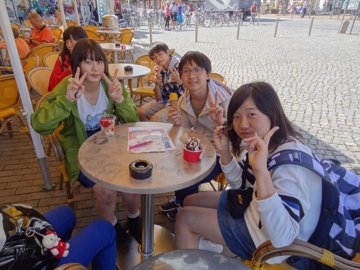 Die hier auf dem Foto haben ziemlich viele Fragen beantwortet, was aus Noriko und Ayano eine Siegergruppe machte. (Und dafür ein Eis)
Die hier auf dem Foto haben ziemlich viele Fragen beantwortet, was aus Noriko und Ayano eine Siegergruppe machte. (Und dafür ein Eis)
Obwohl sie anscheinend den Eintrag von neulich gelesen, sagten sie dass sie immer noch keine Last sein wollten und wollten nur 3 Kugeln bestellen. Als ich aber den Anderen auch Eis angeboten habe, wollten sie doch so ein Monstereis bestellen. Ich hab keine Ahnung wie sie funktionieren...
Ausflug
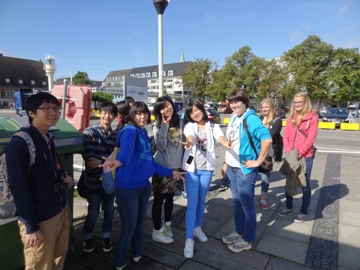 Noch vor dem Anfang des OSKs hatten wir die Diskussion darüber, wo wir im Ausflug hinfahren sollten. Julia und ich haben uns einstimmig auf Kiel geeinigt, weil in der Nähe von Husum keine große Stadt existiert, die auch historisch große Bedeutung hat, außer Hamburg und Kiel. Hamburg ist aber dermaßen groß, dass die Austauschschüler vermutlich sowieso in ihrem Austauschjahr da sein würden.
Noch vor dem Anfang des OSKs hatten wir die Diskussion darüber, wo wir im Ausflug hinfahren sollten. Julia und ich haben uns einstimmig auf Kiel geeinigt, weil in der Nähe von Husum keine große Stadt existiert, die auch historisch große Bedeutung hat, außer Hamburg und Kiel. Hamburg ist aber dermaßen groß, dass die Austauschschüler vermutlich sowieso in ihrem Austauschjahr da sein würden.
8 Uhr 15 (abgemachte Uhrzeit des Treffens). Ich war gerade so angekommen. Lustigerweise war vielleicht eine Hälfte der Schüler da. Sie müssen sich wohl noch an das Leben in Deutschland gewöhnen :) (obwohl in diesem Alter sind die Deutschen auch noch nicht so pünktlich, schätze ich)
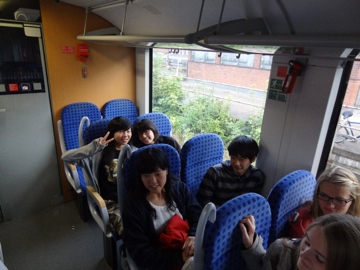 Mit dem Zug nach Kiel. Zum Glück hatten alle Schüler und alle Gastgeschwister das Schleswig Holstein Ticket. Ich finde es gut dass die Schüler lernen, dass man in Deutschland häufig mit der Bahn unterwegs ist. (Und vor allem dass sie häufig unterwegs sind und nicht die ganze Zeit in ihren Heimatstädten bleiben...)
Mit dem Zug nach Kiel. Zum Glück hatten alle Schüler und alle Gastgeschwister das Schleswig Holstein Ticket. Ich finde es gut dass die Schüler lernen, dass man in Deutschland häufig mit der Bahn unterwegs ist. (Und vor allem dass sie häufig unterwegs sind und nicht die ganze Zeit in ihren Heimatstädten bleiben...)
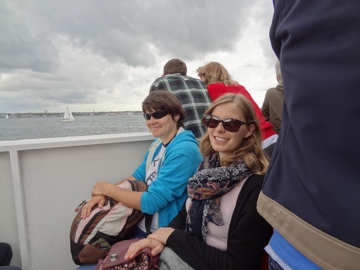 Das erste Objekt war die Nikolaikirche. Die Kirche an sich war nicht ganz so interessant, aber gleichzeitig war der sogenannte "Geistkämpfer", eine Statue, die von den Nazis als "entartete Kunst" bezeichnet wurde, was gestern von Miyu präsentiert wurde. Nikolaikirche an sich hat mich übrigens in dem Sinne überrascht, dass die innere Seite so modern aussah. Sind die Kirchen im Norden immer so?
Das erste Objekt war die Nikolaikirche. Die Kirche an sich war nicht ganz so interessant, aber gleichzeitig war der sogenannte "Geistkämpfer", eine Statue, die von den Nazis als "entartete Kunst" bezeichnet wurde, was gestern von Miyu präsentiert wurde. Nikolaikirche an sich hat mich übrigens in dem Sinne überrascht, dass die innere Seite so modern aussah. Sind die Kirchen im Norden immer so?
Gleich darauf mit dem Schiff nach Laboe. Eigentlich fanden sie die Idee ganz cool mit dem Schiff zu fahren, aber in der Realität irgendwie doch weniger. Na ja egal, wir mussten eh entweder mit dem Schiff oder mit dem Bus fahren.
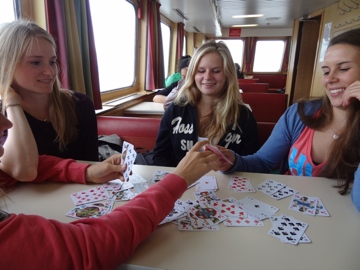 Da niemand Karten zum spielen mitgebracht hatte, habe ich bei Rossmann einfach mal Karten gekauft, wobei ich die Verkäuferin gefragt hatte, ob das was ich hatte normale Karten waren. Erst als wir es aufgemacht haben, hat sich rausgestellt, dass das für Doppelkopf war... Da die Gastgeschwister die mitgekommen waren Doppelkopf kannten, habe ich mich zu ihnen gesetzt. Aber Doppelkopf kann man angeblich nur zu viert spielen und die Regeln sind recht kompliziert (ich hab's einmal gespielt aber ich konnte sie mir nicht merken...). Daher mussten wir mit den Karten für Doppelkopf andere Spiele improvisieren. Hier auf dem Foto haben wir schwarzen Peter gespielt. doof...
Da niemand Karten zum spielen mitgebracht hatte, habe ich bei Rossmann einfach mal Karten gekauft, wobei ich die Verkäuferin gefragt hatte, ob das was ich hatte normale Karten waren. Erst als wir es aufgemacht haben, hat sich rausgestellt, dass das für Doppelkopf war... Da die Gastgeschwister die mitgekommen waren Doppelkopf kannten, habe ich mich zu ihnen gesetzt. Aber Doppelkopf kann man angeblich nur zu viert spielen und die Regeln sind recht kompliziert (ich hab's einmal gespielt aber ich konnte sie mir nicht merken...). Daher mussten wir mit den Karten für Doppelkopf andere Spiele improvisieren. Hier auf dem Foto haben wir schwarzen Peter gespielt. doof...
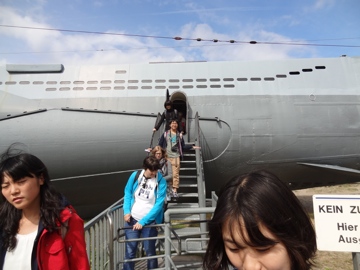 Doof war es noch mal, dass ich nicht so viel Bargeld hatte. In Deutschland kann man so schlecht per Kreditkarte zahlen aber ich hatte es völlig vergessen (weil bei Edeka, wo ich normalerweise einkaufe, kann man per Kreditkarte zahlen) und musste ganz schnell Geld abheben gehen. Ich frage mich hin und wieder mal, ob es nicht ein gutes Thema für die Doktorarbeit wäre, ob es sich lohnt, nur die Kreditkarte zu benutzen, wobei man alle Faktoren in Erwägung zieht, beispielsweise die Energie die man braucht um Münzen zu tragen, die Kosten der Herstellung für Münzen, Psychologische Faktoren wie Überzahlung oder Sicherheit.
Doof war es noch mal, dass ich nicht so viel Bargeld hatte. In Deutschland kann man so schlecht per Kreditkarte zahlen aber ich hatte es völlig vergessen (weil bei Edeka, wo ich normalerweise einkaufe, kann man per Kreditkarte zahlen) und musste ganz schnell Geld abheben gehen. Ich frage mich hin und wieder mal, ob es nicht ein gutes Thema für die Doktorarbeit wäre, ob es sich lohnt, nur die Kreditkarte zu benutzen, wobei man alle Faktoren in Erwägung zieht, beispielsweise die Energie die man braucht um Münzen zu tragen, die Kosten der Herstellung für Münzen, Psychologische Faktoren wie Überzahlung oder Sicherheit.
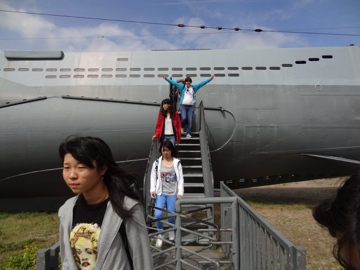 So, in Laboe ist nicht nur ein schöner Strand da, sondern auch ein U-Boot aus dem zweiten Weltkrieg (U995). Das wurde gestern von Noriko vorgetragen.
So, in Laboe ist nicht nur ein schöner Strand da, sondern auch ein U-Boot aus dem zweiten Weltkrieg (U995). Das wurde gestern von Noriko vorgetragen.
Das war sicherlich ein gutes Erlebnis für die Schüler im U-Boot zu sein, aber für mich war es auch. Da wo die Japaner das kollektive Verteidigungssystem vor ein paar Monaten genehmigt haben, ist es natürlich etwas realistischer, dass so was noch auf uns zukommt.
Die winzigen Toiletten und Betten, eine kleine Küche... Können die japanischen Jugendlichen von heute solche Umstände aushalten?
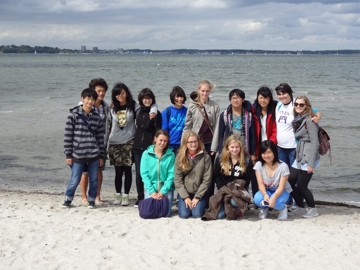 Laboe hatte einen schönen Strand (untypischerweise für Deutschland). In diesem Moment hatten wir auch ein bisschen Sonne. Nice. Wir haben einfach die Tatsache ignoriert, dass es eigentlich nicht kostenlos war für die die über 18 waren, und insgesamt haben wir das Schiff verpasst -.-
Laboe hatte einen schönen Strand (untypischerweise für Deutschland). In diesem Moment hatten wir auch ein bisschen Sonne. Nice. Wir haben einfach die Tatsache ignoriert, dass es eigentlich nicht kostenlos war für die die über 18 waren, und insgesamt haben wir das Schiff verpasst -.-
Egal, wir konnten jedenfalls mit dem Bus, der 15 Minuten später abfuhr, in die Innenstadt zurückfahren. Im Bus habe ich den Schülern erklärt, was die Bilder der Aufgabe von gestern bedeutet haben. Sie kannten sich überhaupt nicht damit aus aber hoffentlich wurde etwas klar für sie.
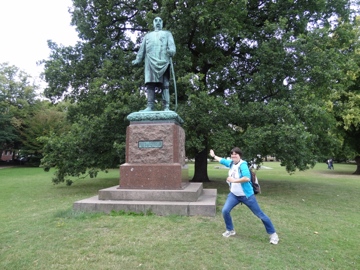 Vor dem Hiroshima Park war ein kleiner Asialaden. Husum ist leider deermaßen klein, dass es erst gar keinen Asialaden gibt (nur man sieht in manchen Supermärkten eine kleine Asiaabteilung, die aber leider nicht groß genug ist, um japanische Produkte zu verkaufen). Und die Schüler wollten da einkaufen. Ich glaube das war tatsächlich das Highlight des Tages für sie...
Vor dem Hiroshima Park war ein kleiner Asialaden. Husum ist leider deermaßen klein, dass es erst gar keinen Asialaden gibt (nur man sieht in manchen Supermärkten eine kleine Asiaabteilung, die aber leider nicht groß genug ist, um japanische Produkte zu verkaufen). Und die Schüler wollten da einkaufen. Ich glaube das war tatsächlich das Highlight des Tages für sie...
Julia vor der Bismarck-Statue. Für mich ist es ein Widerspruch in sich, dass Bismarck in Kiel ist...
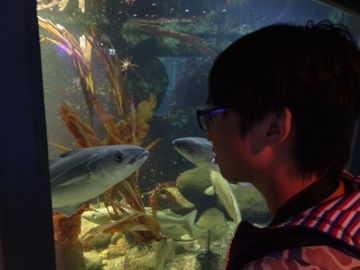 "Habt ihr Hunger?" --- "Nein". Das ist echt ein großes Problem bei den Japanern. Obwohl in ihrer Sprache das Wort "Nein" nicht existiert, sagen sie in diesem Fall nein, und eigentlich haben sie Hunger. Gut, sie müssen wissen, dass das in Deutschland nicht funktioniert. Wir gehen halt weiter.
"Habt ihr Hunger?" --- "Nein". Das ist echt ein großes Problem bei den Japanern. Obwohl in ihrer Sprache das Wort "Nein" nicht existiert, sagen sie in diesem Fall nein, und eigentlich haben sie Hunger. Gut, sie müssen wissen, dass das in Deutschland nicht funktioniert. Wir gehen halt weiter.
Ein kleines Aquarium von Kiel. Ren konnte sich mit einem Dorsch unterhalten, ohne Worte. Vielleicht war es einfacher für ihn mit einem Dorsch zu reden als mit einem Deutschen. Man muss ja zumindest nicht ja oder nein sagen...
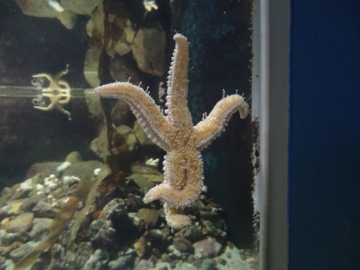 Auch wenn es einen richtig coolen Seesterm gibt, gibt es in Kiel nicht so viel zu sehen. Da uns ca. eine halbe Stunde übrig blieb, ließen wir die Schüler in der Stadt bummeln (oder halt shoppen gehen). Da alle Japaner aus großen Städten kamen, fanden sie es anscheinend wiederum gut, in Kiel einkaufen gehen zu können. Jedenfalls wollte ich nicht mehr dass wir noch den Zug verpassen und habe nicht versuchen wollen noch was zu sehen...
Auch wenn es einen richtig coolen Seesterm gibt, gibt es in Kiel nicht so viel zu sehen. Da uns ca. eine halbe Stunde übrig blieb, ließen wir die Schüler in der Stadt bummeln (oder halt shoppen gehen). Da alle Japaner aus großen Städten kamen, fanden sie es anscheinend wiederum gut, in Kiel einkaufen gehen zu können. Jedenfalls wollte ich nicht mehr dass wir noch den Zug verpassen und habe nicht versuchen wollen noch was zu sehen...
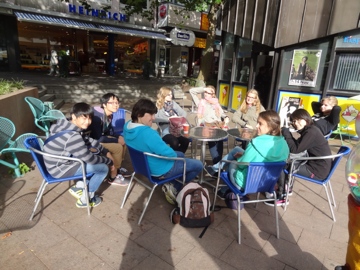 Auf dem Rückweg ist mir aufgefallen, dass Schleswig auf dem Weg war und historisch gesehen wäre es vielleicht sogar noch interessanter gewesen. Schade, dass ich nicht vorher auf die Idee gekommen bin :(
Auf dem Rückweg ist mir aufgefallen, dass Schleswig auf dem Weg war und historisch gesehen wäre es vielleicht sogar noch interessanter gewesen. Schade, dass ich nicht vorher auf die Idee gekommen bin :(
P.S. am folgenden Tag bin ich mit Sarah (meiner Gastgeberin) nach Schleswig gefahren und habe gesehen, dass das Schloss, was der Schwerpunkt gewesen wäre für diese Stadt, ganz schon schwer war und ohne Vorkenntnisse kaum zu verstehen war. Wahrscheinlich war es gut so dass wir nur in Kiel gewesen sind :)
Montag, 18. August
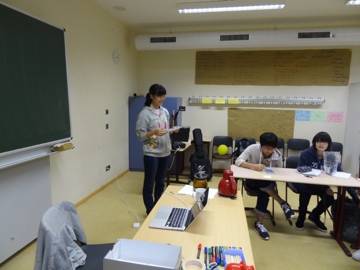 Es ist ganz schön widerlich kalt draußen. Zuhause mussten wir das Kaminfeuer anmachen. So zwischen 10 und 15 Grad. Wie wollen die Schüler so was überleben?
Es ist ganz schön widerlich kalt draußen. Zuhause mussten wir das Kaminfeuer anmachen. So zwischen 10 und 15 Grad. Wie wollen die Schüler so was überleben?
Außerdem hat's einfach nur ganz stark geregnet. Fies... Aber alle Schüler waren vor mir da (ausnahmsweise heute 8 Uhr der Unterricht von mir. Morgen wieder 10 Uhr). Mecker Mecker, weil ich echt ziemlich genau um 8 angekommen bin. :)
Wir haben mit den Präsentationen angefangen. Jo, es ging. Teilweise etwas zu viel abgelesen, aber das werden sie ja sehen.
Das eigentliche Thema von heute war "Freizeit und Internet". Und Hauptsächlich ging es darum, wie man mit der Freizeit umgeht. Zuerst haben wir einen Zeitkuchen gemalt, um zu sehen, wie wir in Japan mit der Freizeit umgeht. Da stellte sich heraus, dass sie ganz schön viel Zeit einsetzen für die Nachhilfeschule, eine Besonderheit von Japan. Ich kenne sie persönlich gar nicht aber anscheinend gehen ziemlich viele Schüler dahin. Ich weiß auch gar nicht ob sich so was lohnt.
In Japan haben die Schüler generell kein Problem damit, eine Beschäftigung zu finden, weil sie normalerweise auch nach der Schule in der Schule um in den Vereinen was zu machen. Ich zum Beispiel konnte schwimmen in der Schule und das war wirklich 7 Tage die Woche. Sonst kann man Basketball, Fußball, Tischtennis, Schach oder Musikinstrumente spielen, malen,
Weiter mit der Diskussion über "wie geht man mit Heimweh um?".
Ich habe ganz viele Ideen bekommen können, so was wie "sich auf etwas Anderes konzentrieren", oder "mit der Gastfamilie sprechen". Letzteres ist glaube ich nicht sehr einfach, obwohl wahrscheinlich die Gastfamilie sich das wünscht. Irgendwo denke ich, dass ich in diesem Sinne was besser machen können während meines Aufenthalts.
Da kam eine Anekdote von mir. In meiner Fahrradreise war ich mehrere Wochen in der Gobi-Wüste. Das hat mich einfach dermaßen zerstört. Da habe ich gesehen, dass religiöse Menschen so viel stärker waren als ich. Es ist wahrscheinlich normal, dass man stark werden kann, indem man denkt, dass sich jemand Anderes das wünscht, der Gott zum Beispiel. Ich habe keine Religion und somit bin ich immer derjenige, der das will, was ich mache, und niemand anders.
Was mache ich? Zumindest kann ich aber die Bibel durch normale Romane ersetzen, auch wenn sie mir nichts beibringen. Zumindest kann ich einfach in die virtuelle Welt tauchen und von der Realität wegkommen. Ursprüngliche Probleme sind häufig dermaßen kompliziert, dass man eh keine Lösung findet. Einfach die Zeit vergehen lassen und irgendwann geht's aufwärts :)
In meinem ersten Aufenthalt in Deutschland habe ich "Unterm Rad" von Hermann Hesse gelesen. War keine bestimmte Aufgabe von jemandem, aber ich habe es lesen wollen. In dieser Tragödie geht das Leben von Hans einfach den Bach runter. Ich muss sagen, dass es mir den Vorteil gegeben hat, zu sehen, dass mein Leben im Vergleich zu dem von Hans keinerlei schlecht war.
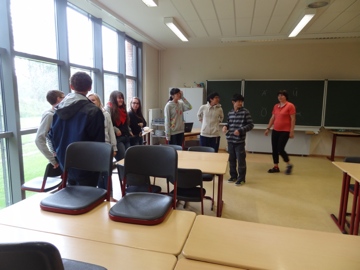 Ich hatte persönlich noch nie Heimweh aber das liegt hauptsächlich daran, dass mein erstes Auslanderlebnis in diesem Sinne recht gut gelaufen ist und ich danach gut abgehärtet war :)
Ich hatte persönlich noch nie Heimweh aber das liegt hauptsächlich daran, dass mein erstes Auslanderlebnis in diesem Sinne recht gut gelaufen ist und ich danach gut abgehärtet war :)
Im Sprachunterricht haben Julia und Sarah ä, ü und ö an die Wand geschrieben und die Schüler in zwei Mannschaften geteilt. Julia las jedes Mal ein Wort vor und wenn das Wort einen Umlaut enthielt, mussten sie schnell an die Wand rennen und zeigen welcher Umlaut es war. Sonst stand auch "kein Umlaut".
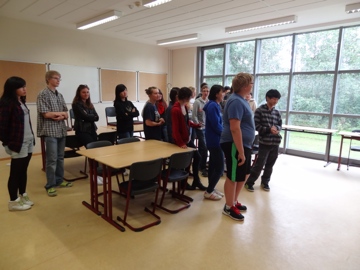 Sowohl Amerikaner als auch Japaner haben diesen Laut nicht (was natürlich das Spiel spannend macht), aber dadurch, dass die Amerikaner einen besseren Wortschatz hatten, war es für sie etwas einfacher. Der einzige Fall, der wirklich schwierig war, war vermutlich "Mütter". Noch schwieriger wäre, denke ich, "Ehre" und "Ähre" gewesen, aber ich bin mir auch nicht sicher, ob die Deutschen diese Wörter wirklich immer unterschiedlich aussprechen...
Sowohl Amerikaner als auch Japaner haben diesen Laut nicht (was natürlich das Spiel spannend macht), aber dadurch, dass die Amerikaner einen besseren Wortschatz hatten, war es für sie etwas einfacher. Der einzige Fall, der wirklich schwierig war, war vermutlich "Mütter". Noch schwieriger wäre, denke ich, "Ehre" und "Ähre" gewesen, aber ich bin mir auch nicht sicher, ob die Deutschen diese Wörter wirklich immer unterschiedlich aussprechen...
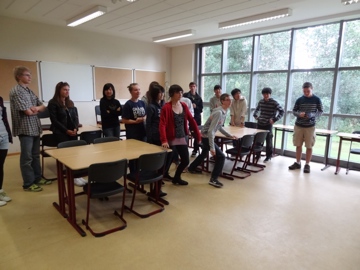 Das schwierigste für die Japaner sind aber nicht die Umlaute, sondern das deutsche "U", das in allen europäischen Sprachen gleich ist. Das japanische "U" existiert, soweit ich weiß, sonst in keiner Sprache, und klingt für die Deutschen wahrscheinlich wie "Ö". Deswegen versteht man's nicht so gut, wenn sie "Husum" sagen (eigentlich traurig ist das :).
Das schwierigste für die Japaner sind aber nicht die Umlaute, sondern das deutsche "U", das in allen europäischen Sprachen gleich ist. Das japanische "U" existiert, soweit ich weiß, sonst in keiner Sprache, und klingt für die Deutschen wahrscheinlich wie "Ö". Deswegen versteht man's nicht so gut, wenn sie "Husum" sagen (eigentlich traurig ist das :).
Nach dem Unterricht haben sie aber angefangen die Organisierung der Abschlussfeier voran zu treiben. Anscheinend diskutieren die Amerikaner und die Japaner erstmal unabhängig voneinander, was auch normal ist weil sie sich kaum unterhalten können.
Dienstag, 19. August
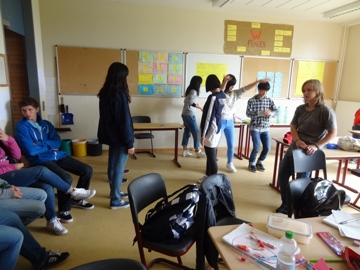 Praktische Hinweise. Was soll ich denen erzählen? Es gibt doch eine wichtige Sache für Ausländer in Deutschland ... Verkehrsregeln!! Es ist in Deutschland auf keinen Fall lustig z.B. über Rot zu fahren. Aber wenn man so was nicht weiß, tut man das halt. Gut, das kann man in einem Satz sagen, aber was ist mit Fußgängerzonen, Fahrradwegen oder Einfahrt verboten? Ich habe einfach ganz viele Karteikarten gemacht, auf denen die Namen auf Deutsch und Japanisch standen und ein Programm auf meinem Computer, das zufällig ausgewählte Bilder zeigen.
Praktische Hinweise. Was soll ich denen erzählen? Es gibt doch eine wichtige Sache für Ausländer in Deutschland ... Verkehrsregeln!! Es ist in Deutschland auf keinen Fall lustig z.B. über Rot zu fahren. Aber wenn man so was nicht weiß, tut man das halt. Gut, das kann man in einem Satz sagen, aber was ist mit Fußgängerzonen, Fahrradwegen oder Einfahrt verboten? Ich habe einfach ganz viele Karteikarten gemacht, auf denen die Namen auf Deutsch und Japanisch standen und ein Programm auf meinem Computer, das zufällig ausgewählte Bilder zeigen.
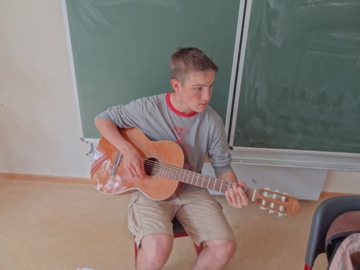 Es ist übrigens recht interessant in Japan Ausländer beim Fahrradfahren zu sehen, weil so etwas wie "rechts vor links" in Japan nicht existiert, aber ein gewisser Rhythmus schon, den nur die Japaner erkennen können. D.h. wenn ein Ausländer da ist, wird es irgendwie chaotisch um ihn herum, obwohl niemand so richtig erklären kann warum. :)
Es ist übrigens recht interessant in Japan Ausländer beim Fahrradfahren zu sehen, weil so etwas wie "rechts vor links" in Japan nicht existiert, aber ein gewisser Rhythmus schon, den nur die Japaner erkennen können. D.h. wenn ein Ausländer da ist, wird es irgendwie chaotisch um ihn herum, obwohl niemand so richtig erklären kann warum. :)
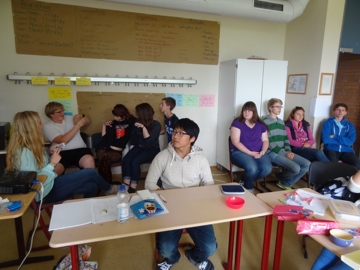 Heute haben wir aber eine halbe Stunde genommen, damit endlich mal die Schüler miteinander kommunizieren können, um zu bestimmen, was sie auf der Abschlussfeier machen. Das war ja irgendwie ganz schön doof weil das in der Tat lediglich von den Schülern organisiert werden müsste. Aber na ja, es ist irgendwie doch wichtiger dass das erst funktioniert...
Heute haben wir aber eine halbe Stunde genommen, damit endlich mal die Schüler miteinander kommunizieren können, um zu bestimmen, was sie auf der Abschlussfeier machen. Das war ja irgendwie ganz schön doof weil das in der Tat lediglich von den Schülern organisiert werden müsste. Aber na ja, es ist irgendwie doch wichtiger dass das erst funktioniert...
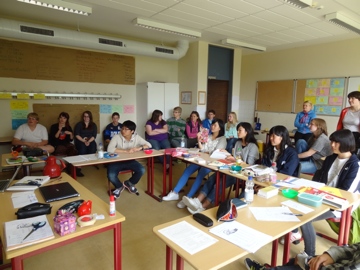 Die Japaner wollten tanzen (cf. das erste Foto). Den Rest habe ich aber nicht mitbekommen. Ich lasse mich einfach mal überraschen :)
Die Japaner wollten tanzen (cf. das erste Foto). Den Rest habe ich aber nicht mitbekommen. Ich lasse mich einfach mal überraschen :)
Vor dem Anfang des Sprachunterrichts haben Julia und Sarah auch Zeit genommen, damit die Schüler zusammen singen konnten. Na ja, das könnte aber tatsächlich ein Teil des Sprachunterrichts sein, auch wenn der Liedtext nicht sonderlich schönes Deutsch ist (auch wenn ich immer noch nicht verrate was das ist für ein Lied :)
Es hat sich in diesem Sinne gelohnt, mir die Gitarre von Akane's Gastfamilie auszuleihen, weil die Schüler ja jetzt so viel Freude haben am singen, aber das wurde jetzt von Noah übernommen, der irgendwie auch eine Gitarre hatte.
Mittwoch, 20. August
Politik. Was ist das für ein Ding?
Japan ist ein sehr interessantes Land, auch wenn das Gleiche für Südkorea und China gesagt werden kann, dass sich die Wirtschaft so weit entwickelt hat, ohne dass sich jemand für Politik interessiert hat.
Ich habe im Unterricht mit der Frage angefangen, "was ist Politik?". Ich habe genau die Antwort erhalten, die ich haben wollte: Ich interessiere mich dafür, aber sie ist viel zu kompliziert.
So, im Rest des Unterrichts ging es hauptsächlich darum, wie nah man eigentlich ist an der Politik und damit, wie man sie bewegen könnte, mit Diskussionen etc.
Nach dem Unterricht gab's wieder etwas Stress wegen der Abschlussfeier von morgen. Ich weiß nicht ob es jemanden interessiert der hier diesen Text liest, aber der Stress kommt hauptsächlich daher, dass die Abschlussfeier grundsätzlich von den Schülern organisiert wird und rein administrativ niemand von uns verantwortlich ist. Es ist aber bei uns dadurch etwas unglücklich gelaufen dass wir zwei Kurse halten und die Klassenräume dafür zu klein sind. Daher ist es ja doch normal dass wir, die Lehrer, uns einsetzen müssen. So, die eigentlichen Ansprechpartner der Gastfamilien sind Hannah und ich, die Orientierungslehrer, aber da hat eine Gastmutter der Ami-gruppe ein ganzes Gebäude des Klinikums (in dem sie arbeitet) angeboten, allerdings kam diese Info nicht direkt zu uns, sondern zu Vanessa, die in unserer WhatsApp-gruppe aktiv war. Wir hatten gleichzeitig ein anderes Angebot von einem Grillplatz, das auch sehr attraktiv war aber wegen des Wetters doch nicht zur Auswahl stand, was sich aber erst vorgestern etwa feststand. Jedenfalls konnten wir keine definitive Antwort geben und wir (die Lehrer) dachten, dass Vanessa mit ihr persönlich Kontakt hätte und sie auf dem Laufenden gehalten hätte, was sich offensichtlich als falsch erwiesen hat. Insgesamt wird es trotzdem stattfinden. Es ist aber schade, dass das alles etwas unglücklich gelaufen ist, weil das nicht aus Faulheit oder böser Absicht entstanden ist, sondern aus Missverständnissen. Auf dem Rückweg (nachdem wir uns die Räumlichkeiten angeguckt haben) hatten Hannah und ich noch mal eine Diskussion darüber und was man hätte besser machen können. In dem Moment dachte ich mir, dass es besser gewesen wäre, wenn man von vorne rein eine zuständige Person bestimmt hätte, aber im Nachhinein denke ich, dass das vielleicht auch nicht besser gewesen wäre. Uns hat einfach eine ganz normale Kommunikation zwischen der Organisatorin und den Lehrern gefehlt. Es tut uns aber jedenfalls sehr leid dass wir es durcheinander gebracht haben.
Donnerstag, 21. August
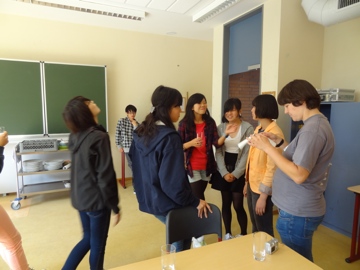 Was ist denn eigentlich noch alles schwierig auszusprechen für die Japaner? Das deutsche "R". Wie üben die Japaner? Die gurgeln erstmal. Ne gute Lösung, wa?
Was ist denn eigentlich noch alles schwierig auszusprechen für die Japaner? Das deutsche "R". Wie üben die Japaner? Die gurgeln erstmal. Ne gute Lösung, wa?
Zum Glück brauchte ich damals kein Wasser um "r" auszusprechen, aber ich konnte es nicht in einem Wort sagen, so zum Beispiel bei "reparieren". Das aller aller erste Wort, das ich aussprechen konnte (rate mal Ute, du warst da in dem Moment), kam als wir uns über die olympischen Spiele unterhalten gefragt haben, wer auf dem dritten Platz war. Es war nämlich "Russland". Ich habe es einmal geschafft, beim zweiten Mal nicht mehr. Dann musste ich es mehrmals wiederholen, bis ich es einigermaßen hingekriegt habe.
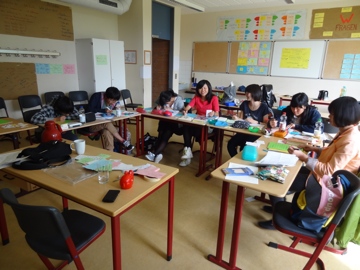 Wegen der Abschlussfeier von heute Abend konnten sich die Schüler kaum noch auf den Unterricht konzentrieren. Das Thema war ja auch "Ausblick". Was soll man denn da noch machen?
Wegen der Abschlussfeier von heute Abend konnten sich die Schüler kaum noch auf den Unterricht konzentrieren. Das Thema war ja auch "Ausblick". Was soll man denn da noch machen?
Ich habe einfach mal die Schüler abgefragt, wohin sie gehen, was für eine Familie sie haben werden und vor allem, worauf sie sich freuen. Offentsichtlich kam aber meine Absicht nicht so richtig rüber und sie hatten nicht so richtig Ahnung, was sie dazu hätten erzählen sollen. Na ja, sagt einfach, dass eure neuen Gastfamilien so toll sind!!
Hier auf dem Foto habe ich sie einfach ganz frei Erwartungen am Austauschjahr aufschreiben lassen, weil ich wollte dass sie noch mal schriftlich vergewissern, warum sie nach Deutschland gekommen sind, und vor allem deswegen, weil sie sich nicht mehr daran erinnern können werden. Dadurch habe ich mich dazu verpflichtet, am 2. Juli 2014 in Hamburg zu sein, um ihnen diese Zettel zurückzugeben.
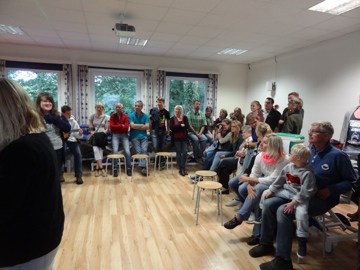 Nach dem Unterricht sind Hannah und ich zum Klinikum rübergegangen, das von der einen Gastmutter zur Verfügung gestellt wurde (s.o.). Wie gesagt, sollte die Abschlussfeier von den Schülern organisiert und wir wollten uns wirklich ums Minimum kümmern.
Nach dem Unterricht sind Hannah und ich zum Klinikum rübergegangen, das von der einen Gastmutter zur Verfügung gestellt wurde (s.o.). Wie gesagt, sollte die Abschlussfeier von den Schülern organisiert und wir wollten uns wirklich ums Minimum kümmern.
Zum Glück waren wir ja schon 2 Stunden im Voraus da, aber ich glaube ich hab durch zahlreiche Veranstaltungen in den letzten 3 Wochen verstanden: sie fangen pünktlich an, weil ich war sozusagen der Türsteher weil der Eingang nicht sehr eindeutig war und konnte sehen, dass tatsächlich niemand durch die Tür gegangen ist nach 18 Uhr, außer vielleicht Sarah, die aber selber sagt sie sei nicht so deutsch. (aha?)
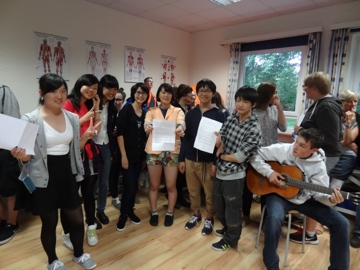 Zum Anfang des Abschlussfestes haben die Schüler direkt das eine Lied gesungen, das sie in den letzten zwei Wochen gelernt haben: An der Nordseeküste. Eigentlich fanden sie den Text richtig doof (kann man aber verstehen...) aber das Lied an sich fanden sie ganz schön (vor allem die Amis). Ich habe dazu ein Video gemacht und wird hier bestimmt auftauchen, sobald ich rausgefunden habe, wie man es kleiner macht :) Die Gastfamilien kannten anscheinend den Text nicht und konnten anscheinend deswegen nicht mitsingen, aber handklatschen schon :) (Das war ja auch ganz gut)
Zum Anfang des Abschlussfestes haben die Schüler direkt das eine Lied gesungen, das sie in den letzten zwei Wochen gelernt haben: An der Nordseeküste. Eigentlich fanden sie den Text richtig doof (kann man aber verstehen...) aber das Lied an sich fanden sie ganz schön (vor allem die Amis). Ich habe dazu ein Video gemacht und wird hier bestimmt auftauchen, sobald ich rausgefunden habe, wie man es kleiner macht :) Die Gastfamilien kannten anscheinend den Text nicht und konnten anscheinend deswegen nicht mitsingen, aber handklatschen schon :) (Das war ja auch ganz gut)
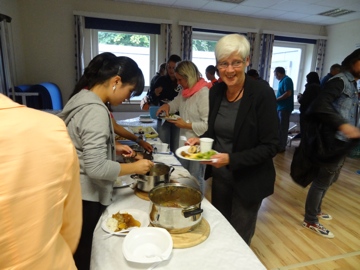 Das Essen wurde auch von den Schülern organisiert. Die Japaner haben den japanischen Curry gekocht, der aber auch richtig gut bei den Leuten ankam. Die Amis gekaufte Kekse? Hm, keine Ahnung.
Das Essen wurde auch von den Schülern organisiert. Die Japaner haben den japanischen Curry gekocht, der aber auch richtig gut bei den Leuten ankam. Die Amis gekaufte Kekse? Hm, keine Ahnung.
Allerdings hat es anscheinend recht viel Stress gegeben bei der Vorbereitung, vor allem bei der Gastfamilie von Miyu, weil die Gastmutter auch nicht so genau bescheid wusste und alles auf einmal auf sie zukam. Hm, na ja. So ähnlich hatte ich mir das vorgestellt und war dementsprechend keine Überraschung für mich. :)
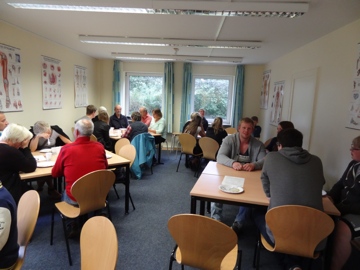 Hier in diesem Jahr werden die Schüler wohl noch erfahren, was sie für Essen kochen können in Deutschland. Es ist zum Beispiel schwierig, Ramen (japanische Nudelsuppe) zu machen, weil man häufig schlürft. Und man sollte auch schlüfen in Japan, weil man damit zeigt, dass es einem schmeckt. Und es riecht vielleicht etwas ungewöhnlich für Deutsche.
Hier in diesem Jahr werden die Schüler wohl noch erfahren, was sie für Essen kochen können in Deutschland. Es ist zum Beispiel schwierig, Ramen (japanische Nudelsuppe) zu machen, weil man häufig schlürft. Und man sollte auch schlüfen in Japan, weil man damit zeigt, dass es einem schmeckt. Und es riecht vielleicht etwas ungewöhnlich für Deutsche.
Ansonsten ist die Misosupper auch schlecht in Deutschland. Sie hat zu wenig Geschmack. Es war mir auch klar, dass das Nori, das sie verteilt haben, nicht sonderlich populär sein würde, weil das ja eben auch fast gar keinen Geschmack hat. Traditionnel ist es in Japan immer so.
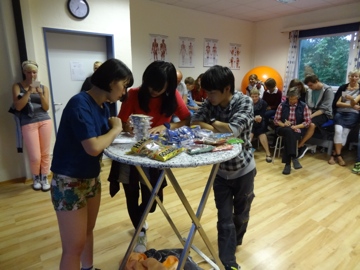 Letzte Woche haben die japanischen Schüler fleißig Zahlen gelernt (und sind auch einkaufen gegangen s. Eintrag vom 15. August). Wie kann man das demonstrieren?? - Bingo!! Also Bingo gespielt. Das war übrigens der Grund warum sich niemand so richtig am Unterricht beteiligen konnte. Die mussten die Karten noch herstellen :)
Letzte Woche haben die japanischen Schüler fleißig Zahlen gelernt (und sind auch einkaufen gegangen s. Eintrag vom 15. August). Wie kann man das demonstrieren?? - Bingo!! Also Bingo gespielt. Das war übrigens der Grund warum sich niemand so richtig am Unterricht beteiligen konnte. Die mussten die Karten noch herstellen :)
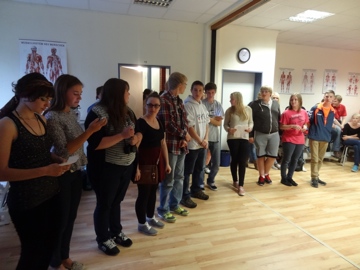 Die Amis wollten noch eine Rede halten, jeder einen Satz. Ich habe insgesamt nicht so häufig mit ihnen sprechen können und somit weiß ich nicht genau, was die Gastfamilien davon halten. Aber diejenigen die ich in der Stadt gesehen habe waren häufig mit den Deutschen unterwegs. Ich war jedenfalls von der Offenheit und der Freundlichkeit der amerikanischen Schüler recht überrascht. In diesem Sinne war es für die beiden Gruppen nicht so schwierig, eine gemeinsame Abschlussfeier zu halten.
Die Amis wollten noch eine Rede halten, jeder einen Satz. Ich habe insgesamt nicht so häufig mit ihnen sprechen können und somit weiß ich nicht genau, was die Gastfamilien davon halten. Aber diejenigen die ich in der Stadt gesehen habe waren häufig mit den Deutschen unterwegs. Ich war jedenfalls von der Offenheit und der Freundlichkeit der amerikanischen Schüler recht überrascht. In diesem Sinne war es für die beiden Gruppen nicht so schwierig, eine gemeinsame Abschlussfeier zu halten.
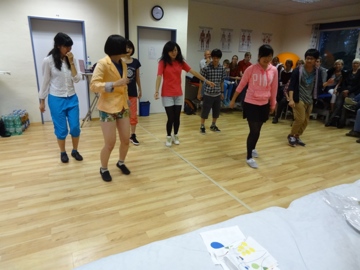 Die Japaner haben in den letzten paar Tagen fleißig getanzt. Heute morgen konnte ich schon hören "woa, ich bin aufgeregt.". Aber als es soweit kam, konnte fast niemand mehr sprechen. Ich denke nicht dass es peinlich war, aber in Deutschland werden sie sowieso lernen, dass so was nie peinlich ist. In Frankreich hat sich eine Kollegin von mir beschwert, weil ich während meines Vortrags so gesprochen hätte, als wüsste ich alles. Das ist extrem positiv in Deutschland, und andersrum in manchen Ländern. Ich mach's weiter so, weil ich mag auch Leute die mit Selbstvertrauen sprechen, und ich möchte ganz gerne, dass meine Schüler das auch lernen :) Ansonsten war der Tanz an sich vielleicht etwas ungewöhnlich für die Deutschen, weil das eine sozusagen neulich in Fernosten enstandete Mode war. In Frankreich wäre es vielleicht ganz gut gegangen, weil die stehen voll auf solche Sachen (asiat. Mode).
Die Japaner haben in den letzten paar Tagen fleißig getanzt. Heute morgen konnte ich schon hören "woa, ich bin aufgeregt.". Aber als es soweit kam, konnte fast niemand mehr sprechen. Ich denke nicht dass es peinlich war, aber in Deutschland werden sie sowieso lernen, dass so was nie peinlich ist. In Frankreich hat sich eine Kollegin von mir beschwert, weil ich während meines Vortrags so gesprochen hätte, als wüsste ich alles. Das ist extrem positiv in Deutschland, und andersrum in manchen Ländern. Ich mach's weiter so, weil ich mag auch Leute die mit Selbstvertrauen sprechen, und ich möchte ganz gerne, dass meine Schüler das auch lernen :) Ansonsten war der Tanz an sich vielleicht etwas ungewöhnlich für die Deutschen, weil das eine sozusagen neulich in Fernosten enstandete Mode war. In Frankreich wäre es vielleicht ganz gut gegangen, weil die stehen voll auf solche Sachen (asiat. Mode).
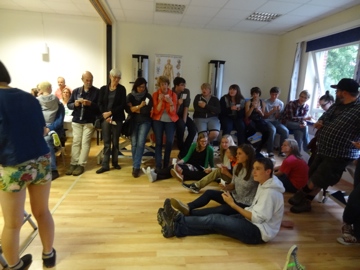 Danach kam aber wie üblich in Deutschland "Zugabe! Zugabe!". Offensichtlich waren die Japaner total verwirrt und zwar TOTAAAAL, weil sie nicht wussten dass man in Deutschland einfach so was tut und einfach die Show beenden kann. So, die versuchen sich etwas einfallen zu lassen. Nach einer 5-minütigen chaotischen Diskussion war es dann doch vorbei. Vielleicht hätte ich schon vorher darauf hinweisen sollen...
Danach kam aber wie üblich in Deutschland "Zugabe! Zugabe!". Offensichtlich waren die Japaner total verwirrt und zwar TOTAAAAL, weil sie nicht wussten dass man in Deutschland einfach so was tut und einfach die Show beenden kann. So, die versuchen sich etwas einfallen zu lassen. Nach einer 5-minütigen chaotischen Diskussion war es dann doch vorbei. Vielleicht hätte ich schon vorher darauf hinweisen sollen...
Dann war die Feier an sich vorbei. Im Gegensatz zum Stress war es im Allgemein ganz gut. Es gab zum Glück keinen Abschied mit Tränen. Morgen ist der letzte Tag. Tja.
Freitag, 22. August
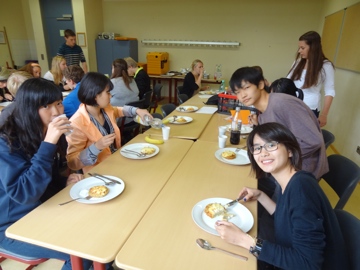 Der letzte Tag sah aus, als sei es ein ganz normaler Tag. Aber irgendwo in der Luft konnte man die Spannung spüren, die man zum Beispiel vor der Klausur spürt, oder auf dem Flughafen. Auch wenn für mich der Flughafen mittlerweile ein ganz gewöhnlicher Ort ist, wird er niemals normal sein. Mir kommt es immer so vor, als würden die Leute teilweise gar nicht atmen.
Der letzte Tag sah aus, als sei es ein ganz normaler Tag. Aber irgendwo in der Luft konnte man die Spannung spüren, die man zum Beispiel vor der Klausur spürt, oder auf dem Flughafen. Auch wenn für mich der Flughafen mittlerweile ein ganz gewöhnlicher Ort ist, wird er niemals normal sein. Mir kommt es immer so vor, als würden die Leute teilweise gar nicht atmen.
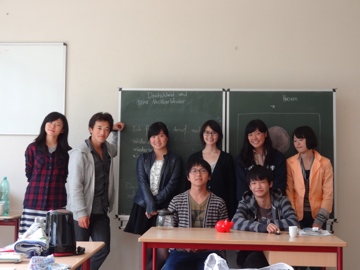 Kurz vor dem Mittagessen ging Julia weg. Die Schüler haben sie alle gemocht und ich hab persönlich großen Respekt vor ihr als Lehrerin, auch wenn ich nicht sonderlich kooperativ war.
Kurz vor dem Mittagessen ging Julia weg. Die Schüler haben sie alle gemocht und ich hab persönlich großen Respekt vor ihr als Lehrerin, auch wenn ich nicht sonderlich kooperativ war.
Nach dem Essen habe ich es also übernommen, obwohl ich da auch nichts mehr zu sagen hatte. Die Plakate haben wir ganz gut loswerden können. Davon waren eigentlich ganz viele aber sie wollten sie haben. Ich weiß gar nicht mehr was wir vor zehn Jahren damit gemacht haben, aber ich hatte jedenfalls kein Plakat hinterher.
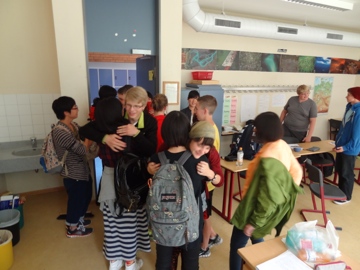 Während Hannah und ich das Geschirr etc. aufgeräumt haben, hatten meine Schüler den Klassenraum aufgeräumt (vor allem Miyu, danke). Somit musste ich fast nichts mehr machen als ich da angekommen bin.
Während Hannah und ich das Geschirr etc. aufgeräumt haben, hatten meine Schüler den Klassenraum aufgeräumt (vor allem Miyu, danke). Somit musste ich fast nichts mehr machen als ich da angekommen bin.
Zu meiner Überraschung habe ich ein Bild mit kurzen Sätzen von jedem, ein Kuscheltier :) und Karten bekommen von den Schülern.
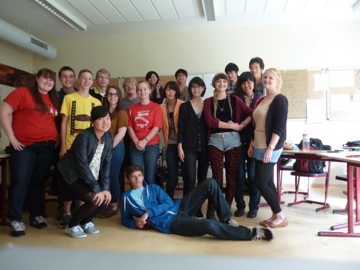 Wir sind dann noch mal alle zusammen in die Stadt gegangen, um bei Janny's, zum letzten Mal, Eis zu essen. Das Ende kam plötzlich, als ich einen Anruf von Hannah bekommen habe, dass die Sachen, die noch im Klassenraum lagen, rausgenommen werden mussten. Ich habe jeden Schüler einmal in den Arm genommen, ganz ungewöhnlich in Japan, und fuhr los.
Wir sind dann noch mal alle zusammen in die Stadt gegangen, um bei Janny's, zum letzten Mal, Eis zu essen. Das Ende kam plötzlich, als ich einen Anruf von Hannah bekommen habe, dass die Sachen, die noch im Klassenraum lagen, rausgenommen werden mussten. Ich habe jeden Schüler einmal in den Arm genommen, ganz ungewöhnlich in Japan, und fuhr los.
Der Himmel war wieder grau in dieser kleinen Stadt, so wie er an meinem ersten Tag in Deutschland war. Wir sehen uns am 2. 7. 2015, aber nicht am gleichen Ort.
Viel Spaß.
My personal epilogue
Conference in Paris!
Maybe you didn't really know that, but actually I'm a researcher in theoretical physics and I have conferences every now and then. This time it's called condensed matter in Paris (well, probably not the sexiest title you'd come up with) and my talk will be held on the 28th.
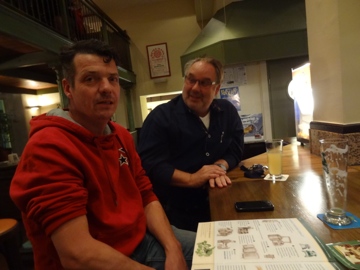 On the very last evening in Husum, Klaus and I went to the city center. I like the German beer, but probably not as much as we drank there...
On the very last evening in Husum, Klaus and I went to the city center. I like the German beer, but probably not as much as we drank there...
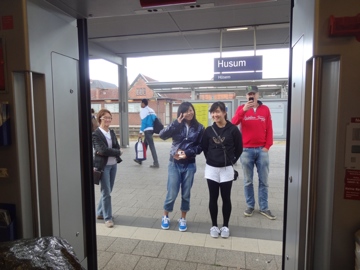 At first, I wanted to go to Paris directly from Husum. It's a long way to go, but still the shortest. And there's one night train that can take bicycles, which goes from Berlin up to Paris. Just a week ago, I went to the railway station and tried to buy a ticket... already fully booked...
At first, I wanted to go to Paris directly from Husum. It's a long way to go, but still the shortest. And there's one night train that can take bicycles, which goes from Berlin up to Paris. Just a week ago, I went to the railway station and tried to buy a ticket... already fully booked...
Later on I heard that it's very difficult to get a place for bicycles in that train. So if you want to go from Germany to France with your bicycle, think about it first...
I was about to abandon the idea to take my bicycle back to France, when I came up with the idea "what if I take it all the way back to Lyon?" and looked up: actually there was a night train from Hamburg to Basel and then to Geneva. Perfect! Geneva is just about 150 km away from Lyon and there are local trains all the time.
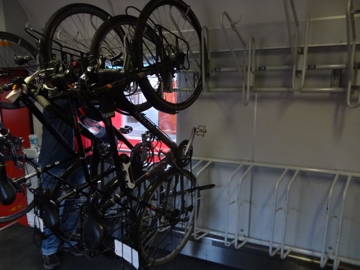 Then I went to the railway station again and got a ticket, although apparently it's normally not very easy either to take this one. Well, anyway I've got one. I went back home.
Then I went to the railway station again and got a ticket, although apparently it's normally not very easy either to take this one. Well, anyway I've got one. I went back home.
At home, I looked up trains from Geneva to Lyon. Well, my story went too well so far... all the railroads from Geneva to Lyon were under construction. There are buses instead but they would not take bicycles... My final plan was to go to Geneva and then to Annecy by bicycle, which is about 40 km away from Geneva, and then to Lyon by train. Would it be possible to do such an acrobatics after a night train and then to go to Paris on the same day? I don't know, I had to try everything out.
Just a couple of hours before my departure, I got a mail from Miyu, saying she'd be also at the station for my departure. Aha. Actually most of them had already left Husum and Rei for example could not be there because there would not have been a bus back home at that time, but she also would have been there (thank you).
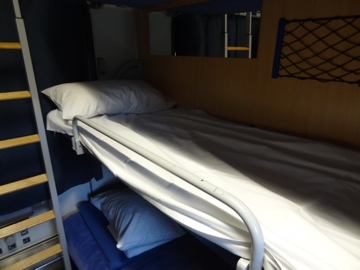 Anyway, thank you Miyu and Ayano for the final farewell. I'm looking forward to seeing you again in one year in Frankfurt. (and also a great thank to the host mother of Miyu for bringing them there and Klaus, who obviously didn't know what time I was to leave Husum and saw me accidentally on the way). And of course thank you for all the messages you wrote me personally today. I was deeply surprised.
Anyway, thank you Miyu and Ayano for the final farewell. I'm looking forward to seeing you again in one year in Frankfurt. (and also a great thank to the host mother of Miyu for bringing them there and Klaus, who obviously didn't know what time I was to leave Husum and saw me accidentally on the way). And of course thank you for all the messages you wrote me personally today. I was deeply surprised.
When I was a student and had a girlfriend who lived in Britanny, I could not afford a berth in a night train and used to go there sitting. I always had to sleep for a while after my arrival. So inefficient at that time. Nice to be independent now.
I think nothing worked out today. My train had a delay of 20 minutes and I had to wait for another train in Basel. Germany may be punctual, but not the German railway...
 Basel, one of the most expensive cities in the world. I had one hour but I didn't want to have franc again so I stayed at the railway station. Here on the advertisement it's written: "My success story: when Brits didn't clean the glasses after each 'th'.". I would love to make French speak English as well as this ad makes sense in France...
Basel, one of the most expensive cities in the world. I had one hour but I didn't want to have franc again so I stayed at the railway station. Here on the advertisement it's written: "My success story: when Brits didn't clean the glasses after each 'th'.". I would love to make French speak English as well as this ad makes sense in France...
In could go to Geneva (finally...), they refused to take my bicycle to Lyon by TGV. I knew that. But at least there was a possibility to take a local train from Annemasse, which was probably about 15 km away from Geneva. What a painful day. I started cycling.
Another problem: I arrived in Annemasse, but the first local train which would take me to Lyon was to leave at 4pm and would arrive there at 9pm. It's simply not possible to go back home, put my bicycle there and go to Paris within today....
I'm not a karate kid, I'm not from the richest family in the world, but there's still something that I'm forever proud of: I can talk. There was namely a bus connection, temporary one while the railway is under construction, and I could negotiate with the bus driver. He eventually allowed me to take my bicycle into the bus. Too cool!
The bus arrived at 3:20 in Lyon. I put my stuff at home and I left Lyon at 5pm. It was too late for the welcome dinner, but still I could be there to be on time for the plenary session of tomorrow.
Conference
Actually this was the very first conference for me and there were a lot of discoveries for me.
The very first thing that drew my attention was the behaviour of the people. Fortunately or unfortunately, it's a known fact that the physicists are often the people who can have much power and reputation. It is anyway more comfortable to sit in a lecture hall with polite students, which they often are, than with these researchers who come and go at any time and stand in front of the overhead projector, with cellphones very often ringing. Am I going to be one of them in the future? (Though at the same time, maybe it's due to a very small group of people who are like this that the entire society of researchers looks this way.)
Another thing, much more importantly, is how the modern science has been performed in reality. So, in order to talk about this stuff, you must know that there are several computational methods in theoretical physics, like for example Density Functional Theory, Molecular Dynamics, Finite Element method etc. And since the emergence of computational physics, there are so many codes that have been developed by specialists. Now there's this problem: with these conventional methods, there is very little things you can do. In short, it is like you buy spaghetti and sauce and you cook them together. Of course there are different types of noodle and sauce, so you can try out different possibilities, but you will never be able to have celery instead of basil in your Italian sauce. There may be the sauce commercially that you are looking for, but it takes probably more time to search for it. In total, you don't do it, and it gets stuck. The conclusion of this story is clear: you must be able to cook, which many people are not. Well, in your daily life maybe it is not important to have different tastes everyday, but in science it is not the case.
This was probably the reason why there were so many people coming to me after my presentation, because my research is like glossy multi-flavoured demi-glass chili con carne. Not a wonder that they were surprised. (By the way, I'm developing a HTML5 code that illustratively explains my research. By the end of next month it'll probably be ready)
But of course I'm not saying the other presentations were bad. It was rather other way round, I was equally surprised of the interesting topics that they worked on. I will probably even try out some of the results.
In the end, the conference that I was not so looking forward to yielded a great harvest for me.
Summer school on Porquerolles island
After the conference in Paris on Saturday I could stay in Lyon for an entire day. I know once again how to appreciate my own apartment, though I could also figure out the horror of staying in Lyon for the entire summer at the same time.
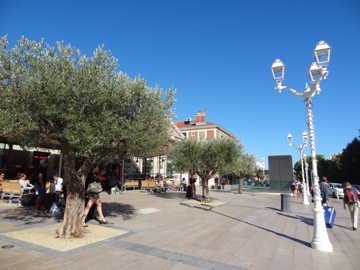 South of France is something entirely different from Paris. It was almost like a bad dream that it was so cold and wet all the time. Of course I carried shorts and a normal shirt, but the weather was still way too hot.
South of France is something entirely different from Paris. It was almost like a bad dream that it was so cold and wet all the time. Of course I carried shorts and a normal shirt, but the weather was still way too hot.
So I guess I haven't explained why I went to the south of France: there was a summer school organized by IFMA (Institut français de mécanique avancée = French institut of advanced mechanics) and Karlsruhe institute of technology. So it was a sort of joint summer school for French and Germans, though the door was open to everyone.
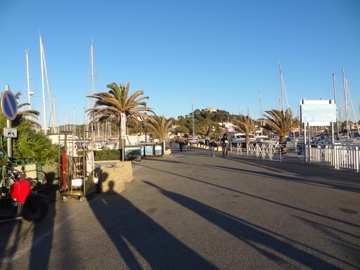 Of course since it's German and French, I estimate myself to be an appropriate person to get there and the subject was related to quantification of uncertainties, something I needed for my research (everyone needs that, though I'll surely not be able to convince you :) But above all, Porquerolles is an amazing place to visit.
Of course since it's German and French, I estimate myself to be an appropriate person to get there and the subject was related to quantification of uncertainties, something I needed for my research (everyone needs that, though I'll surely not be able to convince you :) But above all, Porquerolles is an amazing place to visit.
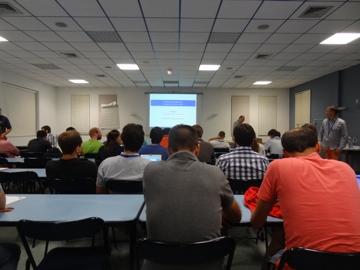 On the boat to Porquerolles, I could meet other participants. In clear contrast to the conference in Paris, no one knew anyone. And especially for Germans it's not so important to hang around with people they know, so I found it much easier to talk to others there didn't feel isolated.
On the boat to Porquerolles, I could meet other participants. In clear contrast to the conference in Paris, no one knew anyone. And especially for Germans it's not so important to hang around with people they know, so I found it much easier to talk to others there didn't feel isolated.
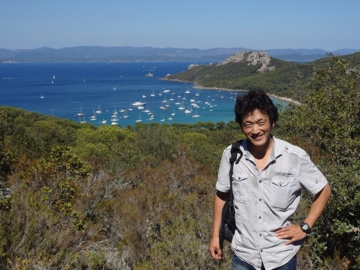 Another nice thing was that we had two courses every day, in the morning and late after noon. So between these two courses, namely from noon to 4pm, we had a very long break every day. What's more, despite the horrible weather which presided over Europe until last week suddenly went away (also everywhere in Europe, but especially here in the Mediterranean sea). It was almost as if the summer arrived in this moment for the first time this year. So, the breaks at noon appeared to me like spending time in paradise.
Another nice thing was that we had two courses every day, in the morning and late after noon. So between these two courses, namely from noon to 4pm, we had a very long break every day. What's more, despite the horrible weather which presided over Europe until last week suddenly went away (also everywhere in Europe, but especially here in the Mediterranean sea). It was almost as if the summer arrived in this moment for the first time this year. So, the breaks at noon appeared to me like spending time in paradise.
This photo was taken during the cycling tour on Wednesday.
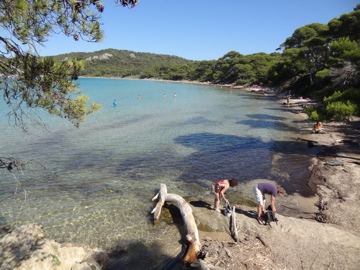 There was a student from Brazil, who was the only one master student. He asked us what it is like to do Ph.D in Europe. Good question. I cannot really say whether it's a good idea or not. Even if we can enjoy the life just as here on the island, it is not clear to me if all the Ph.D students that I have known should have chosen something else or not. Well, what is the problem and the good side of Ph.D at the same time is that this is the first time that we can do something ourselves, simply because there's pretty much no initiative during bachelor and master. So for someone like me, who had always wanted to write an entire molecular dynamics code all alone, it was more than just simple pleasure. However, it is unfortunately also common, that because of relatively good payment for doing our research, the students are not that interested in the stuff, even if they had always been good students. It's a nice thing that Europe decided to pay Ph.D students, but I really really want them to think about it as well. Anyway it was nice to discuss things like this with other students.
There was a student from Brazil, who was the only one master student. He asked us what it is like to do Ph.D in Europe. Good question. I cannot really say whether it's a good idea or not. Even if we can enjoy the life just as here on the island, it is not clear to me if all the Ph.D students that I have known should have chosen something else or not. Well, what is the problem and the good side of Ph.D at the same time is that this is the first time that we can do something ourselves, simply because there's pretty much no initiative during bachelor and master. So for someone like me, who had always wanted to write an entire molecular dynamics code all alone, it was more than just simple pleasure. However, it is unfortunately also common, that because of relatively good payment for doing our research, the students are not that interested in the stuff, even if they had always been good students. It's a nice thing that Europe decided to pay Ph.D students, but I really really want them to think about it as well. Anyway it was nice to discuss things like this with other students.
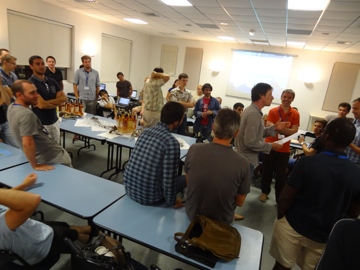 Last evening, we had a wine tasting (welcome back to France!).
Last evening, we had a wine tasting (welcome back to France!).
Following day, I took a train back to Lyon. Actually I could have stayed there one day more but I just found it also nice to go back to Lyon to have a very normal week end. I mean, it was not like I was too tired to stay there more, but it was much more like I was sure that I could love my daily life again.

